List May 2025
|
The author's own copyBETH, Evert Willem (1908-1964)
Les fondements logiques des mathématiques.
Paris, Gauthier-Villars & Louvain, E,Nauwelaerts 1950.
[II],222,[1]p. (Collection de logique mathématique) Cloth, orig. upper wrapper laid
down. The author's bookplate to front pastedown. (#19605)
€ 450
First edition. The author's own copy, almost entirely interleaved with typewritten annotations in Dutch.
This copy was apparently meant to accompany his lectures as professor of logic and the foundations of
mathematics in Amsterdam, or perhaps as a visiting professor at Johns Hopkins University. At end 2 folding
leaves with typewritten errata, probably meant for the second edition that appeared 1955.
| 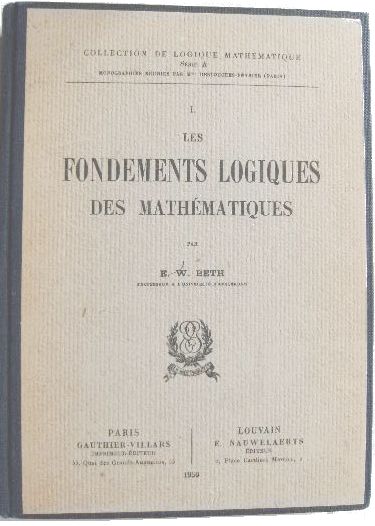 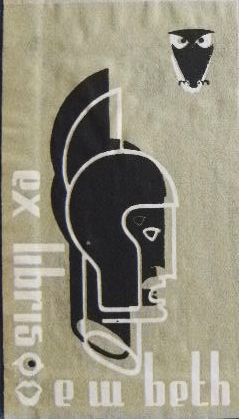 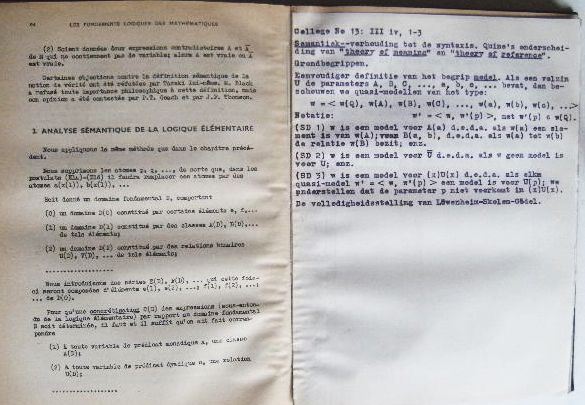 |
BöHM-BAWERK, Eugen von
(1851-1914)
Recent literature on interest (1884-1899). A supplement to ‘Capital and interest'. Translated by
William A.Scott and Professor Doctor Siegmund Feilbogen.
New York, The Macmillan Company 1903.
XLII,[2],151,[4 advert.]p. Orig. red cloth. (#39990)
€ 250 | 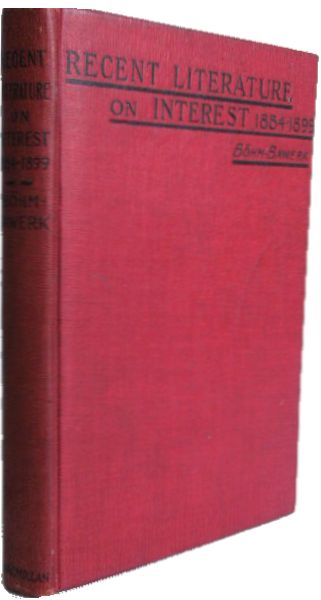 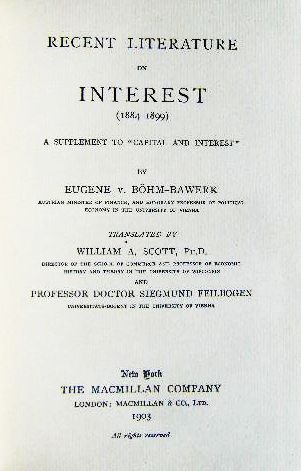 |
First edition. A supplement to William Smart's English translation (1890) of the first edition of
Böhm-Bawerk's Geschichte und Kritik der Capitalzins-Theorien (1884). It is a translation of the appendix
of the second German edition of 1900 in which the author reviewed the literature on interest which had appeared
since the first edition.
BUTTE, Wilhelm (1772-1833)
Grundlinien der Arithmetik des menschlichen Lebens, nebst Winken für deren Anwendung auf
Geographie, Staats- und Natur-Wissenschaft.
Landshut, Philipp Krüll 1811.
XXXIV,[4],420p. With 9 folding tables. Contemp. half calf, red edges, some wear but a good
copy. (#31215)
€ 600 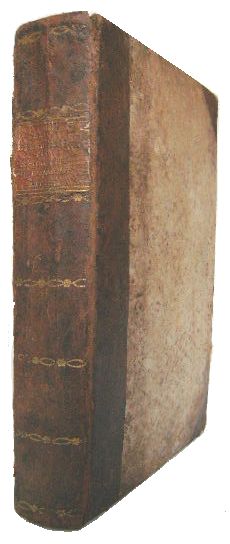 |
First edition. An essay on political arithmetic by a professor of economics and statistics in Landshut. It is
divided into two parts. The first or 'theoretical' part is an attempt to develop 'the principles of the arithmetic of
human life'. In a brief historical survey Butte refers to pioneers in the field of political arithmetic like Graunt,
Petty, Davenant, Malthus, Deparcieux, Messance, Kersseboom and Süssmilch. This is followed by a
typology of human development: 'ideas on the types of human life, comparison of these ideas with observations,
harmony of the proportions connected with the types, and special observance and development of the difference
of gender and (speculative) inquiry into the laws of all possible variations in sexual life'.
The larger second or 'practical' part treats the application of the arithmetic of human life, this in relation to
geographical circumstances, political science and legislation and natural sciences. An abridged French edition of
this appeared the next year in Paris (Prolégomènes de l'arithmétique de la vie
humaine).
*Kress S.5990. Goldsmiths' 20203. Humpert 12238.
| 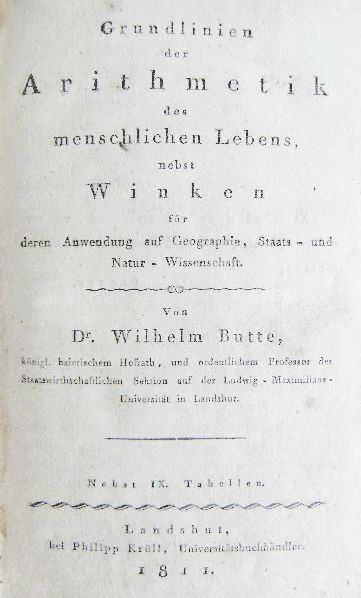 |
 | CAPELLEN VAN DE MARSCH, Robert Jan van der
(1743-1814)
Mémoires du baron de Capellen de Marsch, membre de l'ordre équestre du
Comté de Zutphen et des Etats souverains du Duché de Gueldre, député
extraordinaire à l'Assemblée de leurs Hautes-Puissances les Etats-généraux des
Provinces-Unies. Condamné à perdre la tète, par une sentence de la Cour de Gueldre, du
8 Août 1788, après le bouleversement de la République par les troupes Prussiennes. Traduit du
Hollandois.
Paris, de l'imprimerie de H.J.Jansen 1791.
[II],530,[2]p. Nineteenth-century red morocco, back richly gilt, gilt floral borders, gilt edges
(sd. L.Peeters, Antwerp). Half-title and corner of quires N-P with waterstain. (#32174)
€ 350 | 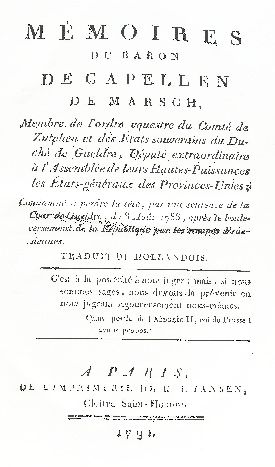 |
First French edition. The author was a Dutch patriot, one of its leaders in the province of Gelderland, and a
cousin of the famous patriot leader Joan Derk van der Capellen tot den Pol. After the restoration of 1787 he fled
to France and in 1788 was sentenced to death for high treason by the Court of Gelderland. As from page 177 a
great number of documents. A Dutch edition appeared the same year in Dunkirk and a second French edition in
1793.
[Coinage]
Discurs von dem heutigen corrupten Zustand des Müntzwesens im Reich, und wie demselbigen
recht und mit Besand wieder aufzuhelffen. [And:] Anmerckungen uber den vor diesem in den Druck
gekommenen Discurs ... In welchen die practicirlichte remedia vorgestellet werden, und der Weg gezeigt wird,
wie die gröste Difficultäten bey denen in Müntz-Sachen auf dem Reichs-Tag in Deliberation
schwebenden dreyzehen, und jüngst dazu gekommenen neun Puncten können erhebt werden, auch was in
dieser Materia jetziger Zeit, und sonderlich bey den Müntz-Probations-Tägen am meisten zu wissen
vonnöthen ist.
Gedruckt im Jahr Christi 1687 & 1692.
2 parts in 1 volume. 4to. 40; 64p. The second part with a nice woodcut head piece and
decorated initial. A few corners with damp stain. Recent blank limp cardboard. (#27509)
€ 750 | 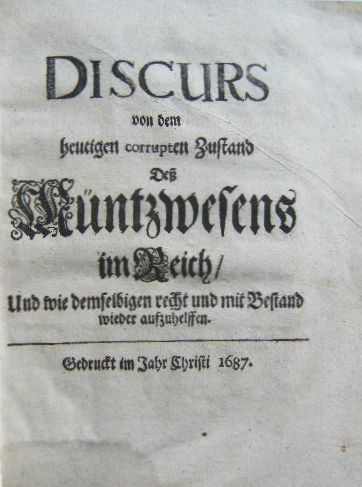 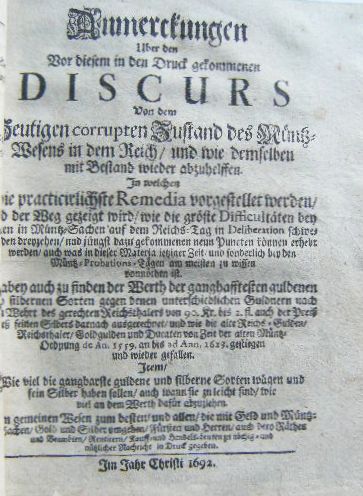 |
An anonymous proposal to improve the coinage system in the German states, with additional proposals
after five years, perhaps by the same author. The title of the second part continues: Dabey auch zu finden der
Werth der ganghafftesten guldenen und silbernen Sorten gegen denen unterschiedlichen Guldnern nach dem
Wehrt des gerechten Reichsthalers von 90. Kr. bis 2. fl. auch der Preiss dess feinen Silbers darnach ausgerechnet,
und wie die alte Reichs-Gulden, Reichsthaler, Goldgulden und Ducaten von Zeit der alten Müntz-Ordnung
de An. 1559. an bis ad Ann. 1623. gestiegen und wieder gefallen. Item, Wie viel die gangbarste guldene und
silberne Sorten wägen und fein Silber haben sollen ... The first part has some tables in the text, i.a. a
table indicating the value of the Gulden, Reichsthaler, Goldgulden and Ducat from 1582 to 1623.
*Not in Kress, Goldsmiths' or Humpert.
CONDILLAC, Etienne Bonnot de
(1714-1780)
Traité des sensations, à Madame la Comtesse de Vassé.
A Londres; et se vend à Paris, chez de Bure 1754.
2 volumes in 1. 12mo. [II],VI,345, [IV],335,[1]p. Early nineteenth century full calf, back richly
gilt with red morocco label, borders blind-tooled, marbled endpapers (on the first half-title: relié le 15
février 1829). Fine copy. Nineteenth century name (‘Marie Cardine') on first blank. (#20061)
€ 500
First edition. Condillac's most important book and one of the most influential works on |
 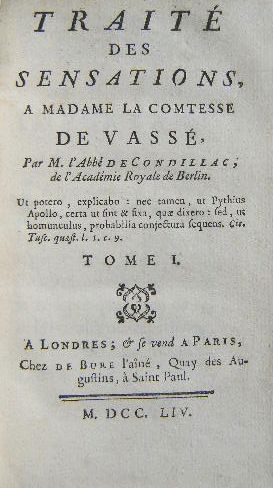 | philosophy
and psychology of the eighteenth century. ‘The conclusion of [this] work is that in the natural order of things,
everything has its source in sensation, and yet that this source is not equally abundant in all men; men differ
greatly in the degree of vividness with which they feel. Finally, he says that man is nothing but what he has
acquired; all innate faculties and ideas are to be swept away.'
*En Français dans le texte 158. INED 1165. Tchemerzine-Scheler II, p.479.
DIEBOLD, John (1926-2005)
Automation. The advent of the automatic factory.
New York, Toronto, London, D. Van Nostrand Company [1952].
[X],181p. Orig. cloth with unclipped ($ 3.00) jacket, jacket has minor chips at top. Fine copy.
Signed presentation inscription: ‘For/ Lester David,/ with best wishes/ John Diebold'. (#20445)
€ 750
First edition. A pioneering work on automation and the ‘possibilities, limitations and social and economic
consequences of the revolutionary new machines of the electronic age and what they will mean in terms of jobs,
cost of goods and services, standards of living and increased leisure time'. It was Diebold's first book, based on
his studies at the Harvard Business School.
‘Owing to independent research and ever-persistent curiosity about the whole field of technology, he
originated many of the concepts of data processing and utilization that are accepted today in both automation and
management. This book was reissued unchanged on its 30th anniversary as a "management classic" by the
American Management Association. He is credited with coining the word automation in its present meaning, and
had much to do with introducing it to general usage.'
|  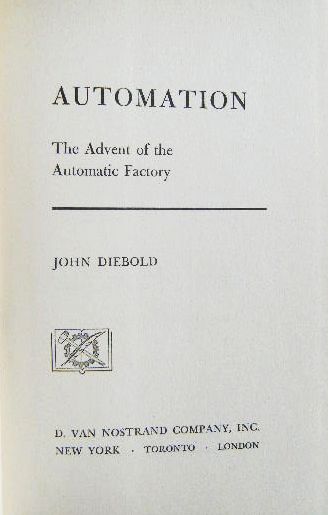 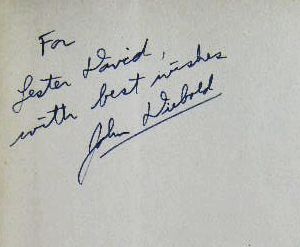 |
[DUTOT, Nicolas (1684-1741)]
Reflexions politiques sur les finances, et le commerce. Où l'on examine quelles ont été
sur les revenus, les denrées, le change étranger, & conséquemment sur notre commerce,
les influences des augmentations & des diminutions des valeurs numéraires des monnoyes.
La Haye, chez les freres Vaillant & Nicolas Prevost 1738.
2 volumes. 12mo. [II],XXI,[1],444; [II],XII,456p. With folding table to volume 1 and 9 folding
tables to volume 2. Contemp. calf, gilt backs with double labels, marbled endpapers, red edges, minor and neat
repairs to extremities. (#14853)
€ 2000 | 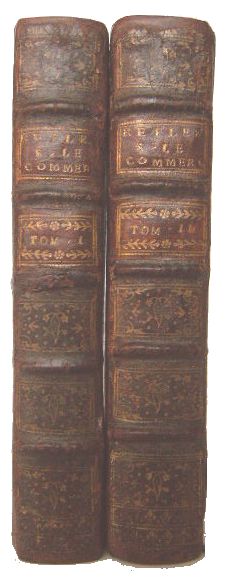 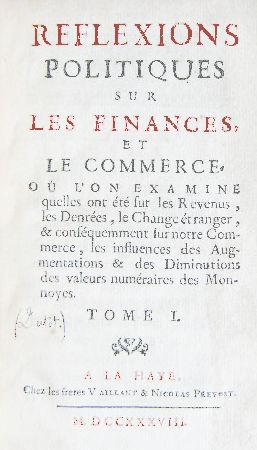 |
First edition. An examination of the effects of the increase and decrease of the value of money on public
revenue, prices and foreign exchange and in consequence on commerce. The author had been a cashier of the
Banque Royale that merged with John Law's Compagnie des Indes in 1720. Until recently his first
name was known as Charles and no further biographical details were known.
It is clear that Dutot supported the system of John Law, and his book includes a refutation of Melon's
Essai politique sur le commerce of 1734, yet it is according to A.Thiers 'undoubtly the most profound
book on Law's system and the causes of its fall'. New editions appeared in 1743 and 1754 and it also was
included in Guillaumin's collection Economistes financiers du XVIIIe siècle.
*Kress 4381. INED 1695. EHB 1295. This edition not in Einaudi. Stourm p.93. Palgrave I,p.660.
EEDEN, Frederik van (1860-1932)
Van Eeden-Colony in N. Carolina U.S.A. Informations for settlers ... Van Eeden-Kolonie in N.
Carolina U.S.A. Inlichtingen voor aspirant kolonisten ...
Amsterdam, W.Versluys 1912.
83p. With illustrations. Orig. printed wrappers. (#14527)
€ 125 | 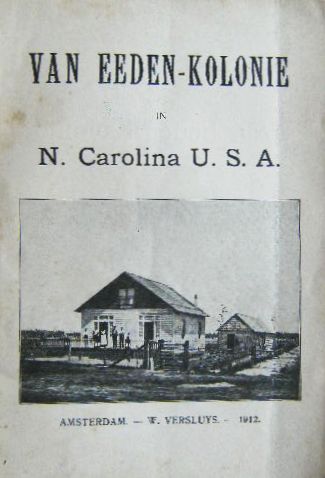 |
First (only) edition. A bilingual Dutch/English booklet advertising to Dutch audiences the Van Eeden
Colony in Wilmington, North Carolina, founded by Frederik van Eeden in 1911. It details the climate, soil
conditions, customs and habits, etc. Frederik van Eeden was a Dutch writer and psychiatrist and founder of a
colony in the Netherlands called ‘Walden' (after Thoreau indeed) that existed from 1898 to 1907.
FRIEDMAN, Milton (1912-2006)
Unemployment versus inflation? An evaluation of the Phillips Curve. With a British commentary
‘The end of ‘'demand management‘': how to reduce unemployment in the late 1970s'.
London, The Institute of Economic Affairs 1975.
48p. Orig. printed wrappers. (IEA lecture no. 2; Occasional paper 44) (#15118)
€ 50 | 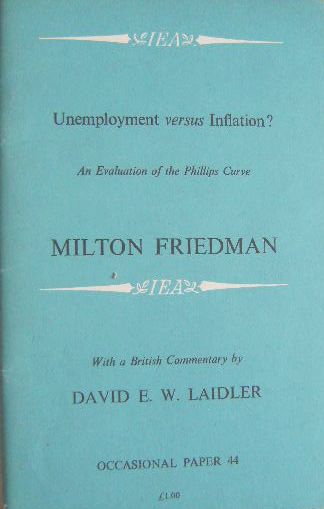 |
First edition.
Galiani, Ferdinando. - [DIODATI, Luigi (1763-1832)]
Vita dell'abate Ferdinando Galiani regio consigliere &c. &c. &c.
Napoli, Presso Vincenzo Orsino Si vende da Giuseppe Maria Porcelli 1788.
[VIII],94p. Modern half vellum, richly gilt back. Some light foxing. (#27000)
€ 650  |
First (only) edition of the first biography of Galiani (1728-1787), published the year after his death. At end
(p.91-94) a bibliography of his published and unpublished works.
Diodati was a follower of Galiani and the author of a controversial work on the state of the coinage in the
Kingdom of Naples Dello stato presente della moneta nel regno di Napoli (1790).
*Kress B.1398. Kress, Italian 57. Einaudi 1574. Mattioli 1025.
| 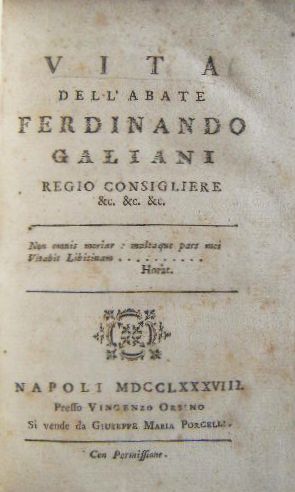 |
GROTIUS, Hugo (1583-1645)
De mari libero et P. Merula de maribus.
Lugd. Batavorum [Leyden], ex officina Elzeviriana [B. & A.Elzevier] 1633.
Small 8vo (11,6 x 6,3 cm). [XVI],267p. With engraved title with a vessel. Contemp. vellum,
upper board with colourful decoration. (#29027)
€ 750 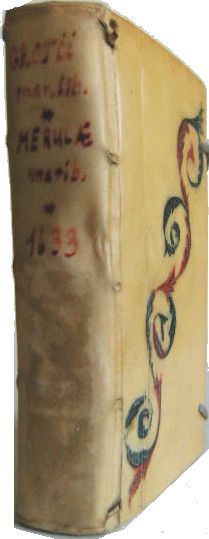 |
One of three editions from the same year. Grotius' seminal treatise on the freedom of the seas ‘or the right
of the Dutch to take part in the Indian trade' as the full title of the original edition of 1609 reads. It was published
at the demand of the Dutch East Indian Company in order to provide a juridical basis for the Dutch overseas
trade in the peace negotiations with Spain. Grotius argued that English, Spanish or Portuguese claims to the
monopoly on the overseas trade were untenable, and also for economic reasons disadvantageously, because he
grasped that a monopoly leads to higher prices. Laspeyres adds that as a matter of fact the Dutch wanted to
destroy the monopoly of the Portuguese only to usurp it themselves.
This volume includes also some related treatises: Paulus Merula's Dissertatio de maribus, Marcus
Zuerius Boxhorn's Apologia pro navigationibus Hollandorum, adversus Pontum Heuterum and the
Tractatus pacis, mutui commercii, sive intercursus mercium, conclusus Londini anno of 1495.
*Ter Meulen & Diermanse 546. Willems 385. Laspeyres p.58 & B.20. Kress 484. Goldsmiths' 649.
McCulloch p.128.
| 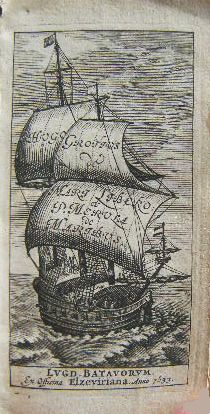 |
Hegel, Georg Wilhelm Friedrich. - SCHUBARTH, Karl Ernst
(1796-1860) & Karl Anton CARGANICO
(1801–58)
Ueber Philosophie überhaupt, und Hegel`s Encyclopädie der philosophischen
Wissenschaften insbesondere. Ein Beitrag zur Beurtheilung der letztern.
Berlin, in der Enslin`schen Buchhandlung 1829.
[XVI],VIII,222,[2]p. Contemp. half calf, marbled sides, gilt back with green label. (#26390)
€ 200  |
First (only) edition. A critical review of Hegel's most complete exposition of his system. Hegel's attempt to
accomplish an all-encompassing science in philosophy was, according to the author, indeed the most
comprehensive of its kind, but failed. He sharply attacked Hegel arguing that faith should not be subordinated to
knowledge. Hegel replied accusing Schubarth of 'pious indulgence in Christianity' and of 'hateful insinuations'.
Schubart had sent a draft of his book to Goethe, who had - in vain - tried to get him a job. Goethe replied
friendly saying that he did not like to polemicize, but acknowledged to Eckermann that Schubarth was a
significant person.
*Allgemeine Deutsche Biographie 32, p.606-612.
| 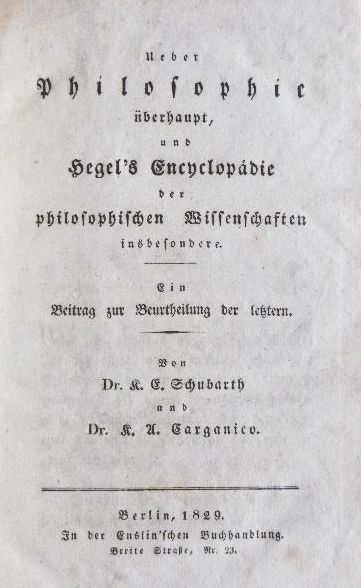 |
[HEY, Johannes van der (1726-1812/13)]
Memorie aan de respective heeren commissarissen van de Generale Nederlandsche Lyfrenten
Compagnie.
[No place or printer 1780.]
Folio (33 x 21 cm). 40p. Worn old wrappers. Once folded, vague stamp on title. Added:
Reglement der geredresseerde Generaale Nederlandsche Lyfrente-Compagnie. Ingegaan den eersten
Mey 1781. [No place or printer 1782.] Folio (33 x 21 cm). XXI,[13]. With 2 folding tables. Very worn old
wrappers, once folded, vague stamp on title. (#20414)
€ 450  |
Two pieces regarding the General Dutch Annuity Company, founded by Johannes van der Hey in
1767, when he united several other similar companies he had founded since 1759.
The company initially prospered but after a few years the profits of the company went into decline. By the
end of the next decade losses showed untenable and Van der Hey was accused of mismanagement and theft. In
the first piece Van der Hey defended his own acting, he denied that there were irregularities in his accounting and
that his attempts to rescue the company were deliberately sabotaged. The second piece gives the regulations of
the company after it was ‘redressed' in 1780. Also this new company collapsed in 1796.
*NCC records a few copies of the first item and only one (IISG) of the second. For Van der Hey see
Bouwstoffen voor de geschiedenis van de levensverzekeringen en lijfrenten in Nederland, p.327-332.
| 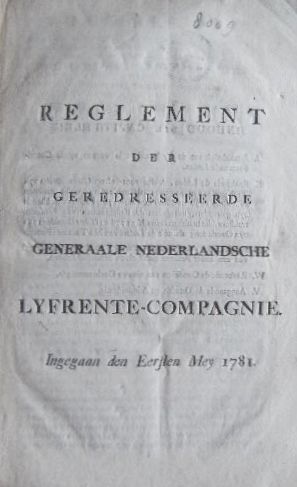 |
HOGENDORP, Gijsbert Karel van (1762-1834)
Memorie over den tegenwoordigen staat van den handel en de culture in de Oost-Indische bezittingen
van den staat.
Te Amsterdam, by de wed. J.Doll 1804.
192,8p. Uncut in contemp. sprinkled boards. (#31796)
€ 350  |
First edition. A plea for a new colonial policy for the Dutch East Indies. The author rejects the contract
trade with native princes and argues for free trade with other nations. It appeared after the liquidation of the East
India Company as a sequel to the author's Brieven aan eenen participant in de Oost-Indische compagnie
of 1802-03.
Gijsbert Karel was the younger brother of Dirk van Hogendorp, also well-known for his fight against the
desastrous policy of the Company. He held conservative liberal ideas and is best known as part of the triumvirate
that established a constitutional monarchy in the Netherlands in 1813.
A notice below the imprint states the book was 'not for sale'.
| 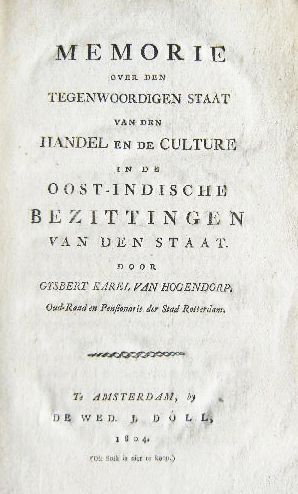 |
[Income tax act]
Observations, &c. upon the Act for taxing income; in which the principles and provisions of the Act
are fully considered, with a view to facilitate its execution, both with respect to persons chargeable, and the
officers chosen to carry it into effect. With the Act at large. Together with the substance of the clauses of the
assessed tax axt that have a reference to this, and a copious index, referring both to the Act and observations.
[ Preceded by:] An Act (passed 9th January 1799,) to repeal the duties imposed by an Act, made in the
last session of Parliament, for granting an aid and contribution for the prosecution of the war; and to make more
effectual provision for the like purpose, by granting certain duties upon income, in lieu of the said duties.
London, printed by George Eyre and Andrew Strahan [ and:] Bunney & Gold 1799.
2 parts in 1 volume. [IV],152,99,[13]p. Yellowed, last leaf stained. Modern gilt-lettered brown
calf over original boards, new white endpapers. (#18600)
€ 750
First edition of both parts. The income tax was introduced by William Pitt the Younger, British prime
minister well acquainted with Adam Smith's economic theories. It was introduced to cover the enormous
expenditure for the French Revolutionary Wars for which the income from the indirect taxes was insufficient.
The tax was originally intended to be abolished after the wars ended, which is what happened in 1802 when the
Peace of Amiens was concluded, but when the hostilities resumed the tax was reintroduced. It was abolished once
more in 1816, and then reintroduced in 1841, and since then became an integral part of the British tax system.
All annual incomes over £200 were taxed at 10 per cent, those between £60 and
£200 were taxed at a graduated rate from just under one per cent to 10 per cent, no one was taxed on
incomes below £60. At first the tax was highly unpopular and was widely evaded, particularly among
merchants and manufacturers, it was thought to be too intrusive into people's private financial circumstances. It
was however a significant step towards fairer and more balanced taxation as it distributed the financial burden
according to the economic capacity of citizens and nowadays the principle of a progressive income tax is
generally accepted.
*Kress B.3864. Goldsmiths' 17629.
| 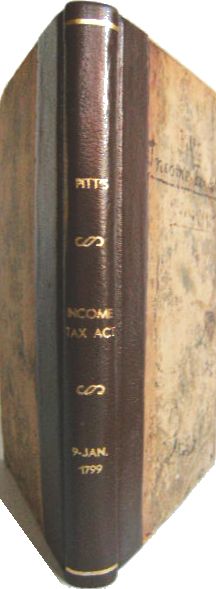 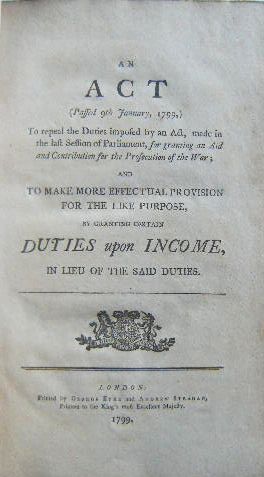 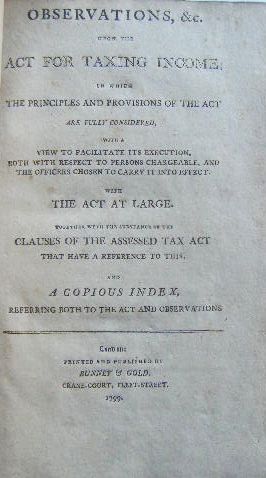 |
[JACOBI, Friedrich Heinrich (1745-1819)]
Etwas das Lessing gesagt hat. Ein Commentar zu den Reisen der Päpste nebst Betrachtungen
von einem Dritten.
Berlin, gedruckt bey Georg Jakob Decker 1782.
Small 8vo. 134p. Uncut and partly unopened in contemp. drab wrappers. (#13811)
€ 350
First (only) edition. Written in response to a remark by Lessing, that what Febronius and his followers
asserted, viz. that the temporal power of the pope should be reduced in favor of the princes, was shameless
flattery of the princes; ‘for all their arguments against the rights of the pope were either no arguments at all, or
they were doubly and trebly valid for the princes themselves. Everyone could understand this; and that no one
had yet said it publicly with all the sharpness that such a subject deserves, among so many who had the most
urgent calling to do so, this was strange enough and a most bad sign‘.
One of Jacobi's polemical writings, in which he ‘presents the despotism of the medieval popes as preferable
to that of enlightened princes'. A commentary on Johannes Müller's ultramontanist publication in defense
of the papacy, in which he placed reason and freedom against despotism and all kinds of arbitrariness.
| 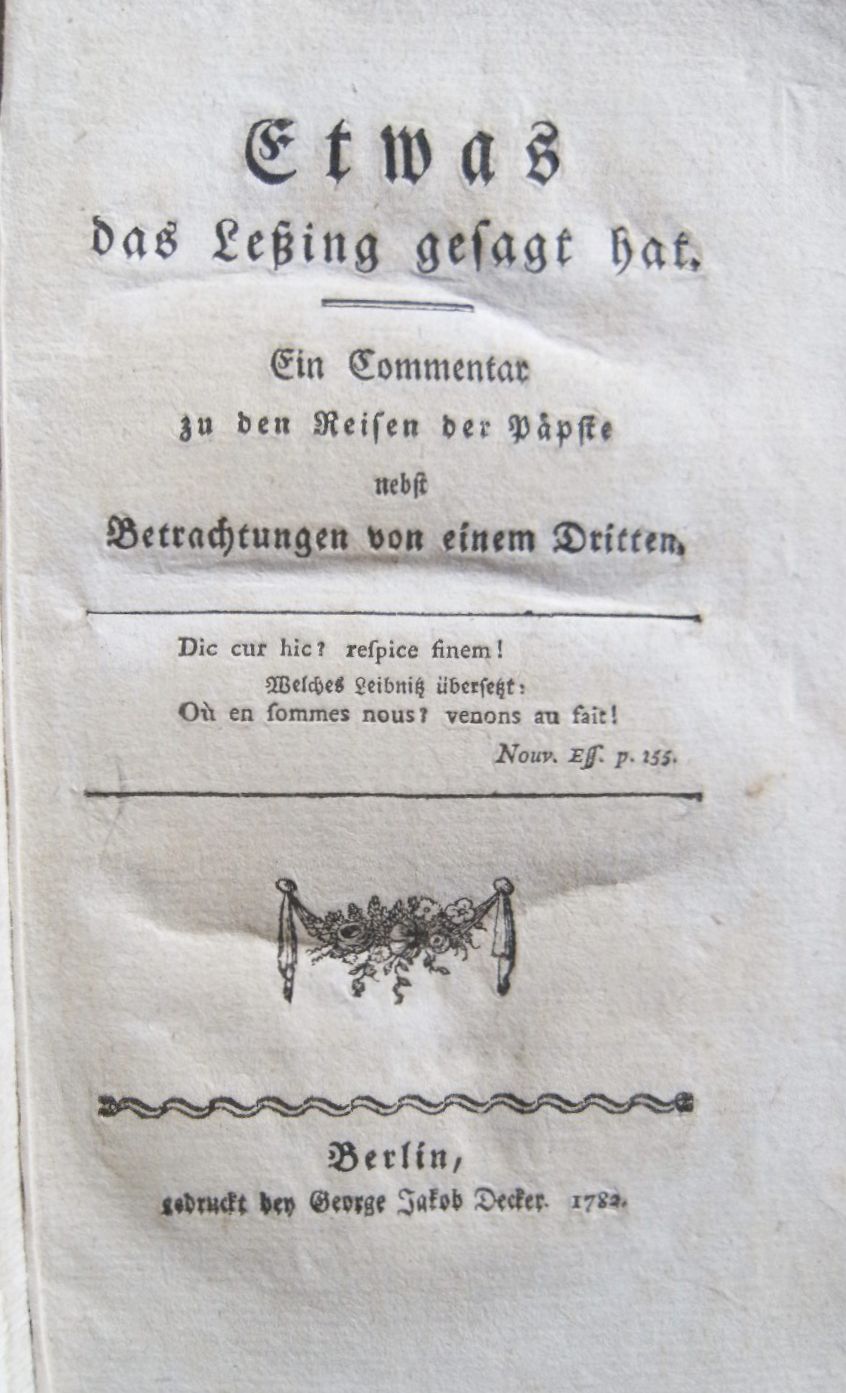 |
[JOLY, Maurice (1829-1878)]
Dialogue aux enfers entre Machiavel et Montesquieu ou la politique de Machiavel au XIXe
siècle [A manuscript copy.]
[No place c.1864.]
117 lvs. Contemp. half brown morocco, marbled sides, gilt back decorated with 3 skulls,
marbled endpapers, front free endpaper partly torn away. Circular stamp with ‘A.B' to front blank. (#13148)
€ 650 |  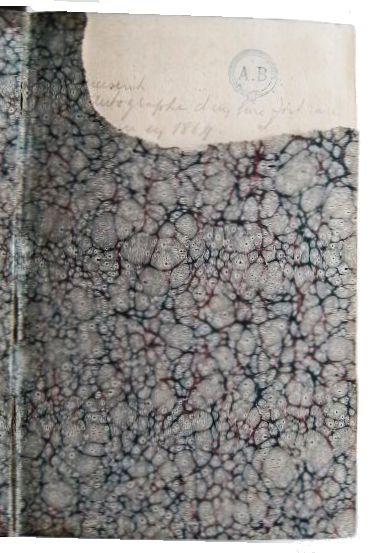 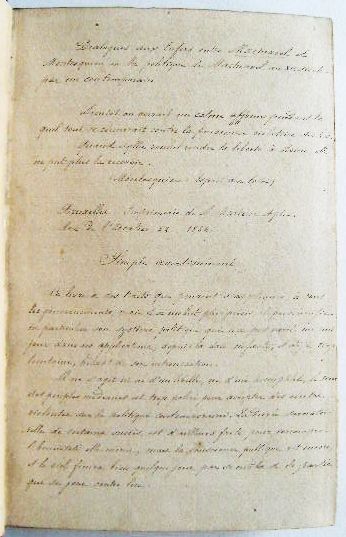 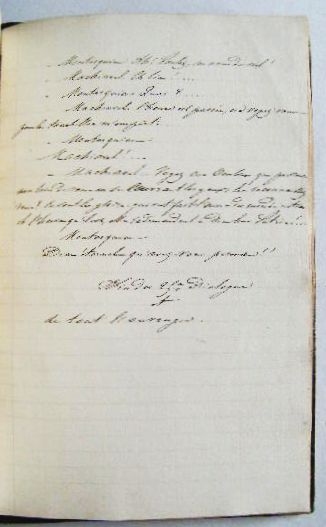 |
A manuscript copy, no doubt produced shortly after the greater part of the printed edition was seized and
destroyed by the police of Napoleon III. The Dialogue in hell between Machiavelli and Montesquieu is a
satirical attack on the authoritarian government of Napoleon and a plea for liberal republicanism in the form of
25 dialogues. It was published anonymously in 1864 at Brussels by A.Mertens and smuggled into France for
distribution, but immediately seized and destroyed and only few copies survived. The writer's identity was soon
discovered and Joly, a lawyer and writer, was arrested and sentenced to 18 months imprisonment. A second
edition did not appear before 1868, again in Brussels and then under Joly's name.
Much of the dubious fame of this book rests on the use made of it by the author(s) of the infamous
antisemitic publication The protocols of the elders of Zion, that sketches a Jewish plot for global
domination and was first published in Russia in 1903, though nothing in the original text of the Dialogue
was antisemitic.
[Judaism]
Organisation civile et religieuse des Israélites de France et du royaume d'Italie.
Décrétée par Sa Majesté l'Empereur et Roi, le 17 mars 1808; Suivie de la
Collection des actes de l'Assemblée des Israélites de France et du royaume d'Italie,
convoquée à Paris en 1806; et de celle des Procès-verbaux et Décisions du
Grand-Sanhédrin, convoqué en 1807, lesquelles ont servi de base à cette organisation.
Paris, chez Treuttel et Würtz 1808.
2 parts in 1 volume. [II],XII,13-328,[II],16,132p. Contemp. half calf, gilt back with red label,
sprinkled edges. (#16478)
€ 900
The Assembly of Jewish Notables was ordered by Napoleon to answer questions regarding Jewish
marriages, among themselves and with Christians, their relations with non-Jewish Frenchmen and the French
state and society, the jurisdiction of the Rabbis, the practice of usury in dealing with strangers, etc.
The Assembly or Sanhedrim was composed of 71 rabbis and laymen and met in Paris from 9 February to 9
March 1807 under the presidency of the Chief Rabbi of Strasbourg, David Sintzheim. It issued nine binding
regulations laying the foundations for the national integration of the French Jews by affirming that they were part
of the French nation, relegating their religious identity to the private sphere. The separation of the political from
the religious in the Jewish population would greatly promote its later assimilation.
‘Napoleon's policy, based as it was on the solicitation of the Jewish community and the taking into account
of their thoughts, was, despite its contradictory nature, combining advances with setbacks for rights for the Jews,
opened the way for a real and lasting integration of the Jews in France.'
|  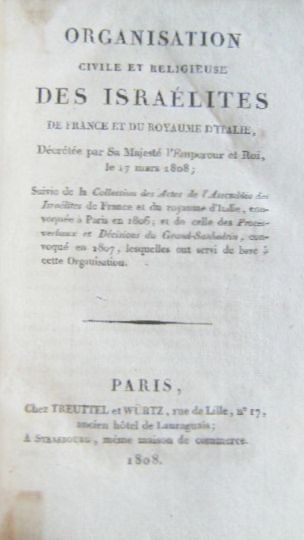 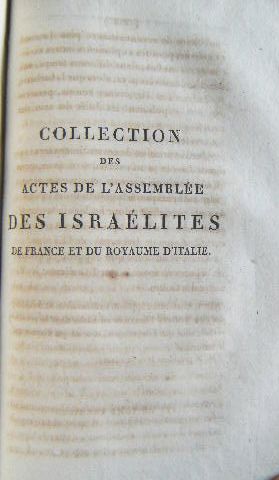 |
KELSEN, Hans (1881-1973)
Reine Rechtslehre. Einleitung in die rechtswissenschaftliche Problematik.
Leipzig und Wien, Franz Deuticke 1934.
XIV,[2],236p. Modern half cloth, back gilt-lettered. Name stamp on front free endpaper,
signature at foot of title. (#22490)
€ 600 | 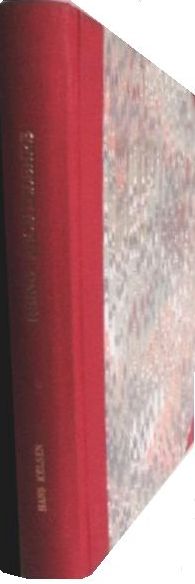 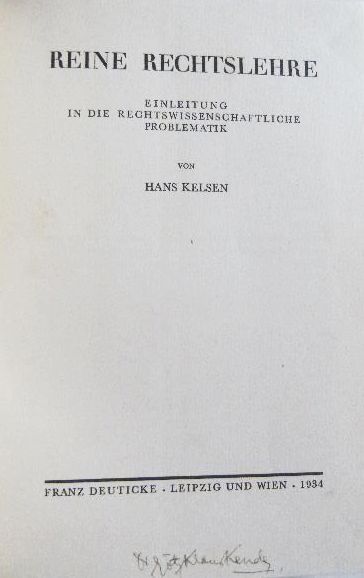 |
First edition. Kelsen's main statement of his theory of law that became one of the major books on law of the
twentieth century. It was written while in Swiss exile and immediately translated into English as Introduction
to the problems of legal theory by Bonnie Litschewski Paulson and Stanley L.Paulson. A much expanded
second edition, effectively a different book, appeared 1960.
[Kipper und Wipper]
Sammelband of eight legal tracts on the problems that arose about the repayment of debts in the
aftermath of the currency crisis in the German states in the early 1620's known as Kipper- und Wipperzeit
(‘Tipper and see-saw time').
Published in Augsburg (6) and Frankfurt am Main 1623-24.
Bound in modern vellum with finger tabs. Browned, some staining and a few marginal repairs.
(#25040)
€ 850
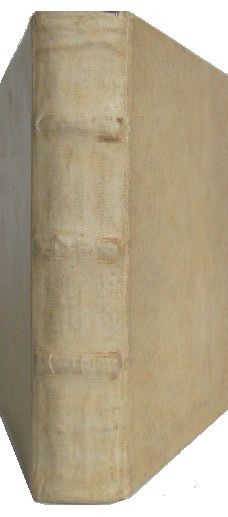 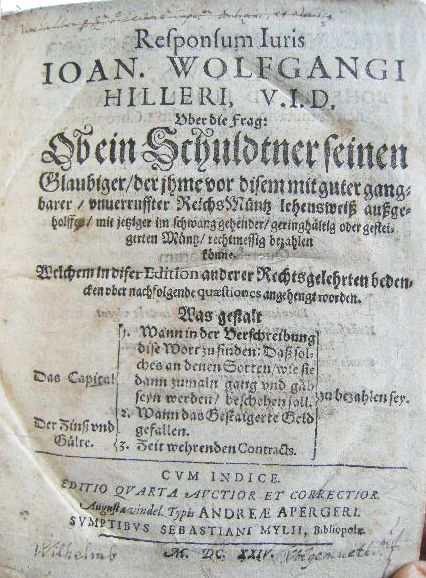 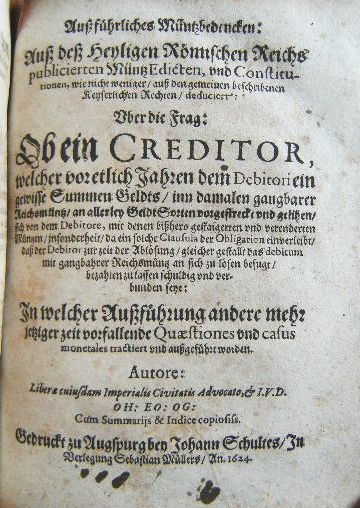 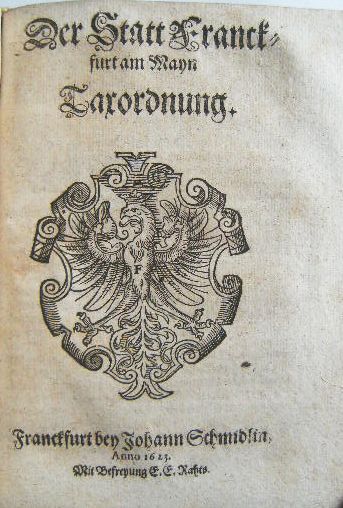
Due to the rising price of silver by the end of the 16th century silver coins of the German
city-states became more worth than their nominal value. After the outbreak of the Thirty Years War currencies
were debased to finance the high costs of the war and the coinage system of the Habsburg Empire fell into
complete disorder. Coins were weighted to sort out the not-yet-debased pieces ('kippen und wippen') and melted
and mixed with copper or other cheap metals and reissued.
It worked in the beginning but soon resulted in worthless coins and the complete disarray of the monetary
system. Prices raised enormously and caused dreadful distress among the population. Popular protest arose and a
great number of pamphlets denouncing the practice appeared between 1620 and 1622. By 1623 the debased coins
were withdrawn, but the losses were carried by the impoverished population.
Contents:
Johann Wolfgang HILLER (1590-1665)
Responsum iuris. Uber die Frag: ob ein Schuldtner seinen Glaubiger, der ihme vor disem mit guter
gangbarer, unverrufter Reichs Müntz lehensweiss aussgeholffen, mit jetziger im Schwang gehender,
geringhältig oder gesteigerten Müntz, rechtmessig bezahlen könne. Welchem in diser Edition
anderer Rechtsgelehrten bedencken ... angehengt worden ... Editio quarta auctior et correctior. Augusta Vindel
[Augsburg], typis Andreae Apergeri, sumptibus Sebastiani Mylii 1624. 4to. [XII],90,[17]p. *Humpert 10962.
Kress 411.
M.LUSTRICIUS [Pseud.] Responsum iuris alterum, das ist: kurtzes aber doch gründlichs
Bedencken, uber dise Quaestion: ob einer, welcher vor etlich Jahren gut Geldt aussgelihen, oder darmit
jährliche Pensiones erkaufft hat, schuldig seye, sich mit groben Müntzen, der jetzigen gestaigerten
hohen Valuta nach, bezahlen zu lassen, oder nicht. Nunc quarto & correctius editum. Gedruckt zu Augsburg,
durch Andream Aperger 1624. 24p. *Humpert 10963. Kress 402.
Cristoph BESOLD (1577-1638) & Johann Georg
BESOLD (1580-1625) Tria Responsa juris. Das ist: drey rechtliche
Bedencken, uber nachfolgende MüntzFragen. 1. Ob ein Schuldtner, welcher den Thaler zu 6. fl.
eingenommen, selbigen nach Absatz der Müntzen, für einen Gulden, dreyssig Creutzer, wider
erlegen müsse? ... Gedruckt zu Augsburg bey Johann Schultes 1624. 70p. The author's names at end of the
three pieces. *Humpert 10959. Kress 397. Goldsmiths' 544. Goldsmiths'-Kress 00544.
Johann Wolfgang HILLER. Informatio juris et aequi. Uber die Frag: ob ein jeder, der leicht oder
gestaigert Geldt aussgelihen, nach jetzigem reducirten Müntzwesen, sich also müss wider bezahlen,
oder ein Abbruch und Detraction geschehen lassen? Editio altera correctior, & auctior. Gedruckt zu Augsburg
bey Johann Schultes 1624. 74p. Goldsmiths' 535.
Aussführliches Müntzbedencken: auss dess Heyligen Römischen Reichs publicierten
Müntz Edicten, und Constitutionen ... uber die Frag: ob ein Creditor, welcher vor etlich Jahren dem
Debitori ein gewisse Summen Geldts, inn damalen gangbarer Reichsmüntz an allerley Geldt Sorten
vorgestreckt und gelihen, sich vor dem Debitore mit denen bisshero gestaigerten und verenderten Müntzen
... bezahlen zu lassen schuldig und verbunden seye ... Gedruckt zu Augsburg bey Johann Schultes 1624.
[XXX],111,[15]p. Goldsmiths' 551.
Der STATT FRANCKFURT AM MAYN newe TAXORDNUNG, publicirt und angeschlagen
Montags den 17. Octobris, anno 1623. Franckfurt bey Johann Schmidlin, anno 1623. 14p. With woodcut coat of
arms of Frankfurt on title.
Der STATT FRANCKFURT AM MAYN TAXORDNUNG. Franckfurt bey Johann Schmidlin,
anno 1623. 47p. With woodcut coat of arms of Frankfurt on title.
Theophilus GLEICH RECHT [Henning Kniephof]
(1596-1663) Consultatio juridica de controversiis ex moneta adulterina
noviter exortis secundum adminicula juris ex æquo & bono decidendis, oder, unvorgreiffliches Bedencken, wie
nunmehr nach restituirtem rechtmässigen Müntzwesen, die hierauss angesponnene Streitigkeiten
mehrentheils, vermüge der rechte und natürlicher Billigkeit, möchten erortert und verglichen werden
... Editio secunda, auctior & correctior, &c. Gedruckt bey Philip Wittel, Inverlegung Johan Birckners 1623.
[IV],92,[16]p. *Humpert 10960. Kress S.540. Goldsmiths'-Kress 005369.
KOUMANS, Pieter (1730-1779,
publisher/printer)
Verklaring van allerhande zo goude, als zilvere, en andere geld-specien; ook van dingen, die voor
geldt in gebruik zyn, alsmede van versierde munten. Twede druk: de helft vermeerdert. Waar by gevoegt een
aantekening van eenige personen, die tot den ouderdom van 100 jaren en daar boven gestegen zyn. Alsmede
enige waarnemingen van ‘t jaarlykse sterfgetal der menschen, enz. in zommige vorstendommen en voorname
steden van Europa.
Te Leeuwarden, gedrukt by Pieter Koumans 1746.
Small 4to. [VIII],99p. Later marbled thick boards. Stamps on title and edges. (#25447)
€ 300 | 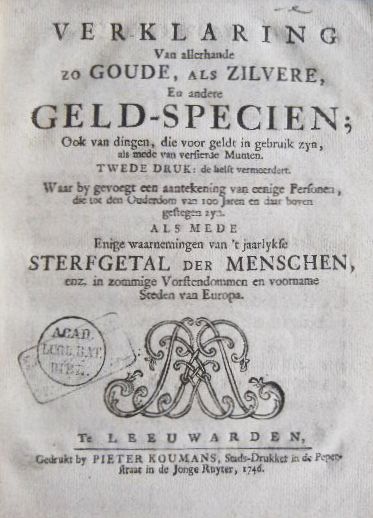 |
Second edition. The first part is an alphabetically arranged dictionary of all kinds of gold and silver coins
and ‘things that are used for money', mostly with their origin and value. The second part (p.79-99), here printed
for the first time, gives a chronologically arranged list of some 50 people died at or over the age of 100, taken
from historical sources. This is followed by some figures on the death rates, baptized children, marriages, etc. in
various European places.
A third edition was published in 1780, with additions to the first part, but without the second part of the
present second edition. We could not find a first edition of this title.
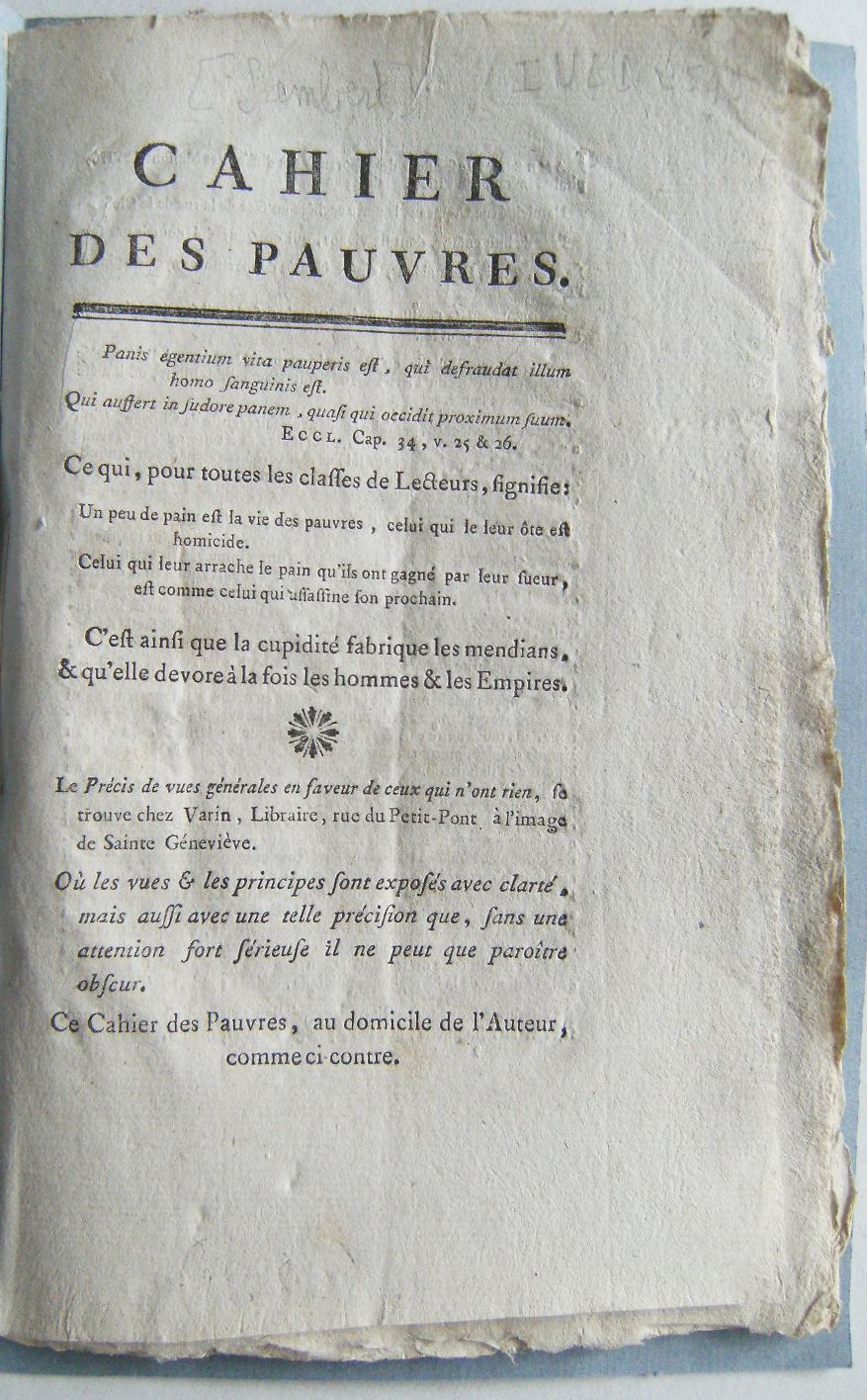 | [LAMBERT, Jean François (1745-1836)]
Cahier des pauvres. Ce qui, pour toutes les classes de lecteurs signifie: Un peu de pain est la vie des
pauvres, celui qui le leur ôte est homicide. Celui qui leur arrache le pain qu'ils ont gagné par leur
sueur, est comme celui qui assassine son prochain. C'est ainsi que la cupidité fabrique les mendians, &
qu'elle devore à la fois les hommes & les empires.
[No place, no publisher 1789.]
16p. With woodcut head-piece. Uncut and stab-stitched in new wrappers. (#27449)
€ 375 | 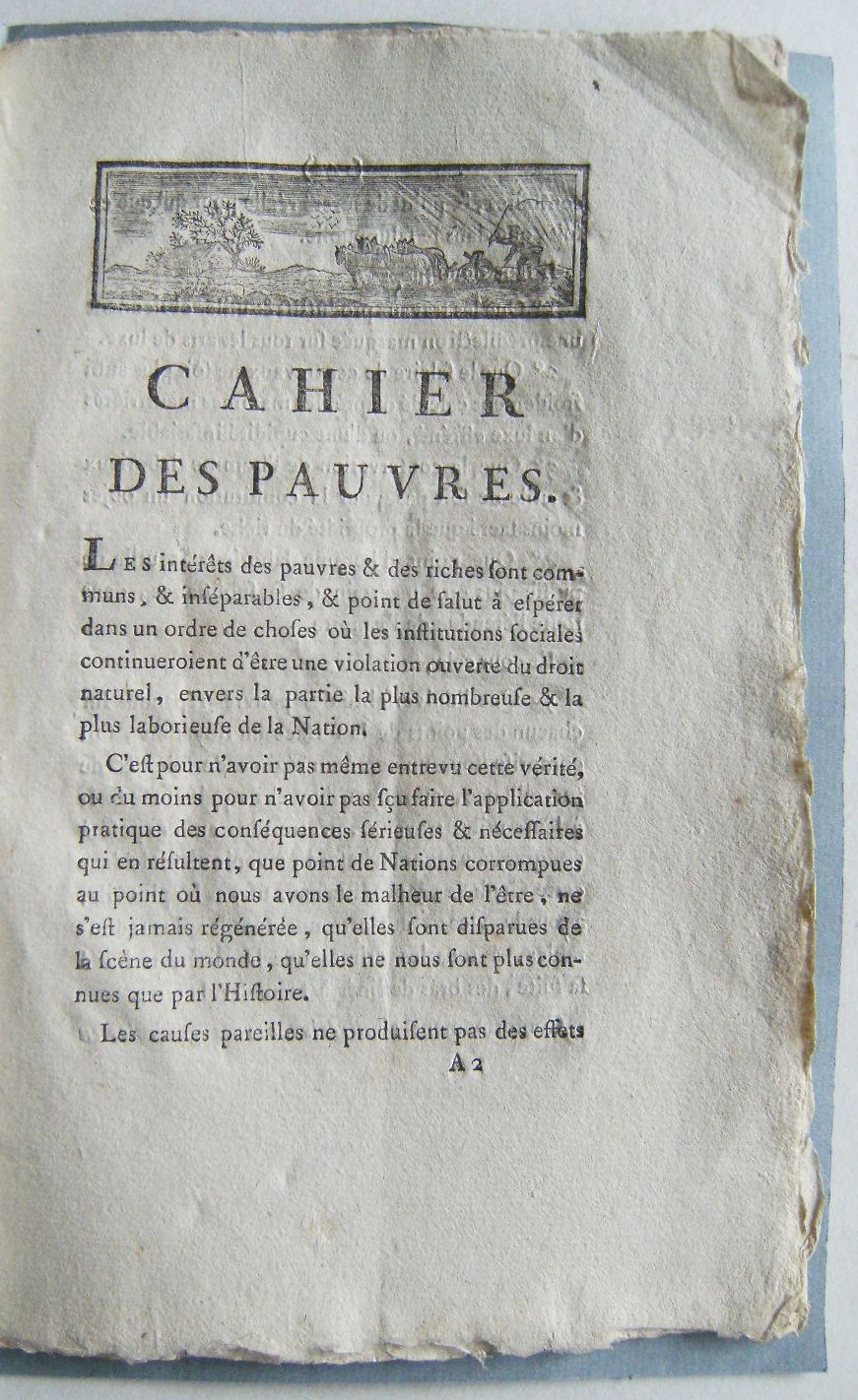 |
First (only) edition, rare. A powerful plea for the rights of the non-propertied class. Among his demands
are that the production of useful goods should be given priority over the production of luxury goods for the rich,
that wages should be sufficient for a decent existence, that everyone who performs useful work should be assured
of his existence, that the condition of the labouring class is a constant concern of the state, etc.
Lambert clearly distinguishes between the labouring class and the propertied class, thus anticipating the
Marxist thinkers of the next century. ‘There are and always will be only two truly distinct classes of citizens: the
owners and the non-owners, the former having everything and the latter having nothing.'
He also states that ‘money does nothing, produces nothing, it is only the sign of things and things are
produced only by the work of men ... it is therefore not money but men who make the strength and the nerve of
states'.
The author identifies himself as ‘inspecteur des apprentis des différentes Maisons de
l'Hôpital Général à la Pitié, 43 years old ... father of 8 children, of which 6
alife, all fed by his wife, and who, God willing, hopes soon to give one more citizen to the state'. He published
the same year a work with similar views, Prècis de vues générales en faveur de ceux
qui n'ont rien.
*INED 2549. A.Lichtenberger, Le socialisme au XVIIIe siècle, p.432. Not in Kress,
Goldsmiths' or Einaudi.
[LANGUET, Hubert (1518-1581) &
Philippe DUPLESSIS-MORNAY (1549-1623)]
De la puissance legitime du prince sur le peuple, et du peuple sur le prince. Traité tres-utile &
digne de lecture en ce temps, escrit en Latin par Estiene Iunius Brutus, & nouvellement traduit en
François.
]No place, no publisher] 1581.
Small 8vo. 264p. Seventeenth century calf, gilt back with red label, red edges. Old name on
title, vague damp stain in last 20 pages. A nice copy. (#29923)
€ 1750 |  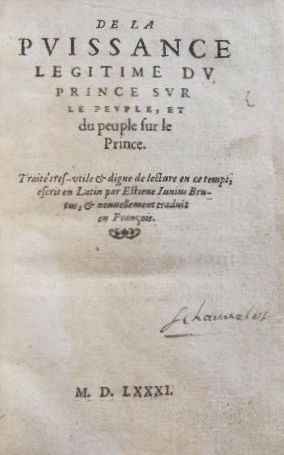 |
First (only) French edition. Originally published anonymously in 1579 as Vindiciae contra
tyrannos. There seems to be no definitive answer as to who the real author was, but it is likely that it was a
collective production. Despite the title stating that this is a new translation, no other translation is known. The
translation has been attributed to François Estienne. ‘This translation more sought after than the Latin
original' (Brunet)
This was the most famous and important text that came from the French protestants, which gives the most
complete summary of Huguenot revolutionary theory. In it, the author(s) give(s) answers to four - seemingly
rhetorical - questions: ‘Are subjects bound to obey princes if their orders contradict the law of God? If it is
permissible to resist a prince who wants to break the law of God or who ruins the church? If it is permissible to
resist a prince who oppresses or ruins a public state, and to what extent this resistance and to what extent this
resistance may be carried? If neighboring princes can or are required by law to give aid to the subjects of other
princes, afflicted because of true religion, or oppressed by manifest tyranny'.
*Hauser 2220. Brunet I,c.1308.
LA SAGRA, Ramon de (1798-1871)
Atlas carcelario o coleccion de laminas de las principales carceles de Europa y de América,
proyectos de construccion, carruages y objetos de uso frecuente en las prisiones. Primera y segunda serie que
contienen las carceles modelos para la Francia, y las construidas en Inglaterra, Escocia, Suiza y Belgica.
Madrid, imprenta del Colegio de sordo-mudos y ciegos 1843.
Folio (39,5x27 cm). Title, index (2p.) and 39 double-page lithographed plans, profiles and
plates. Contemp. calf-backed sprinkled boards, small defect at top of back, edges little rubbed. Two leaves with
corner cut away just touching printed surface, one leaf with a big closed tear, one leaf with a marginal tear.
(#34408)
€ 750
 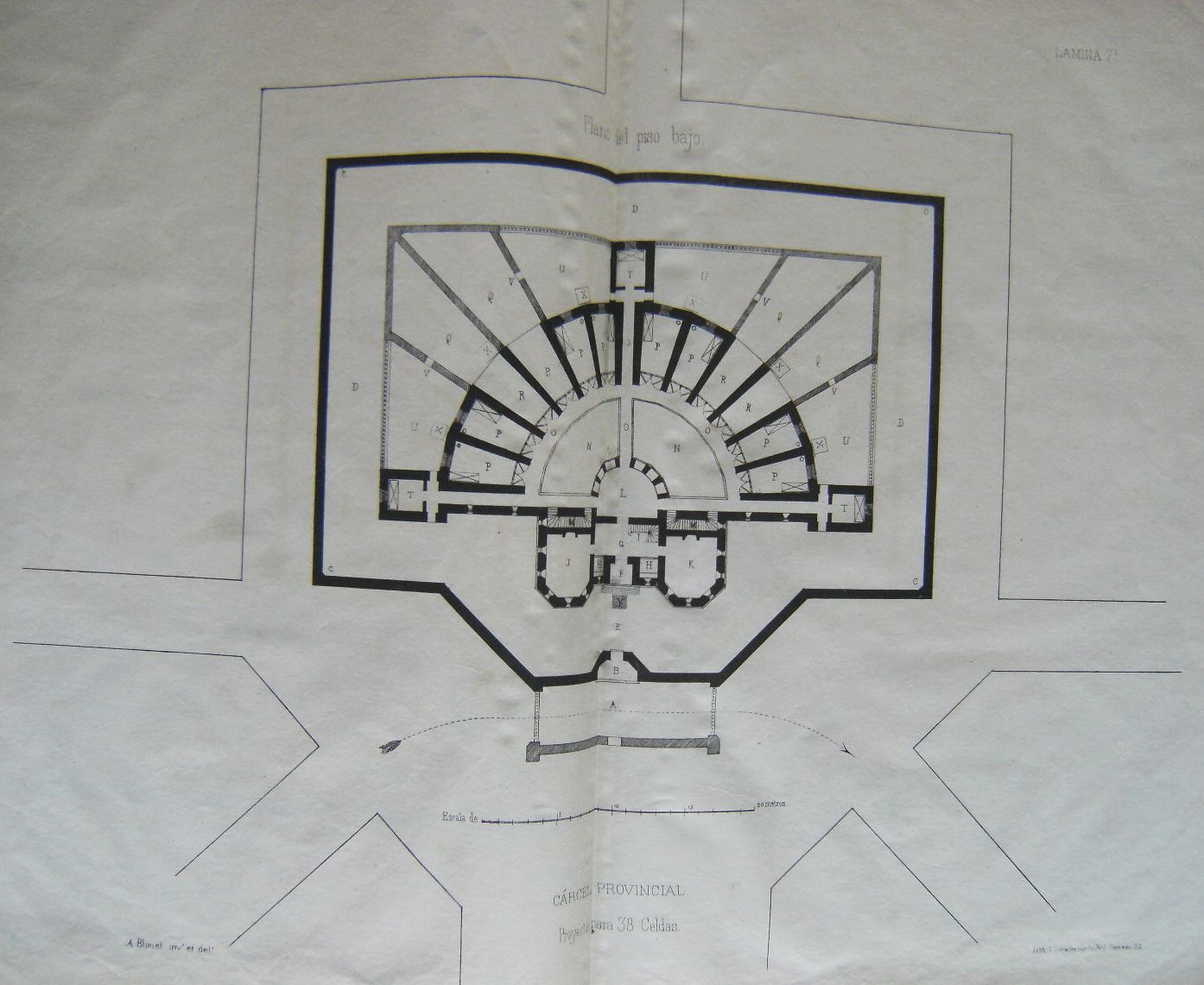 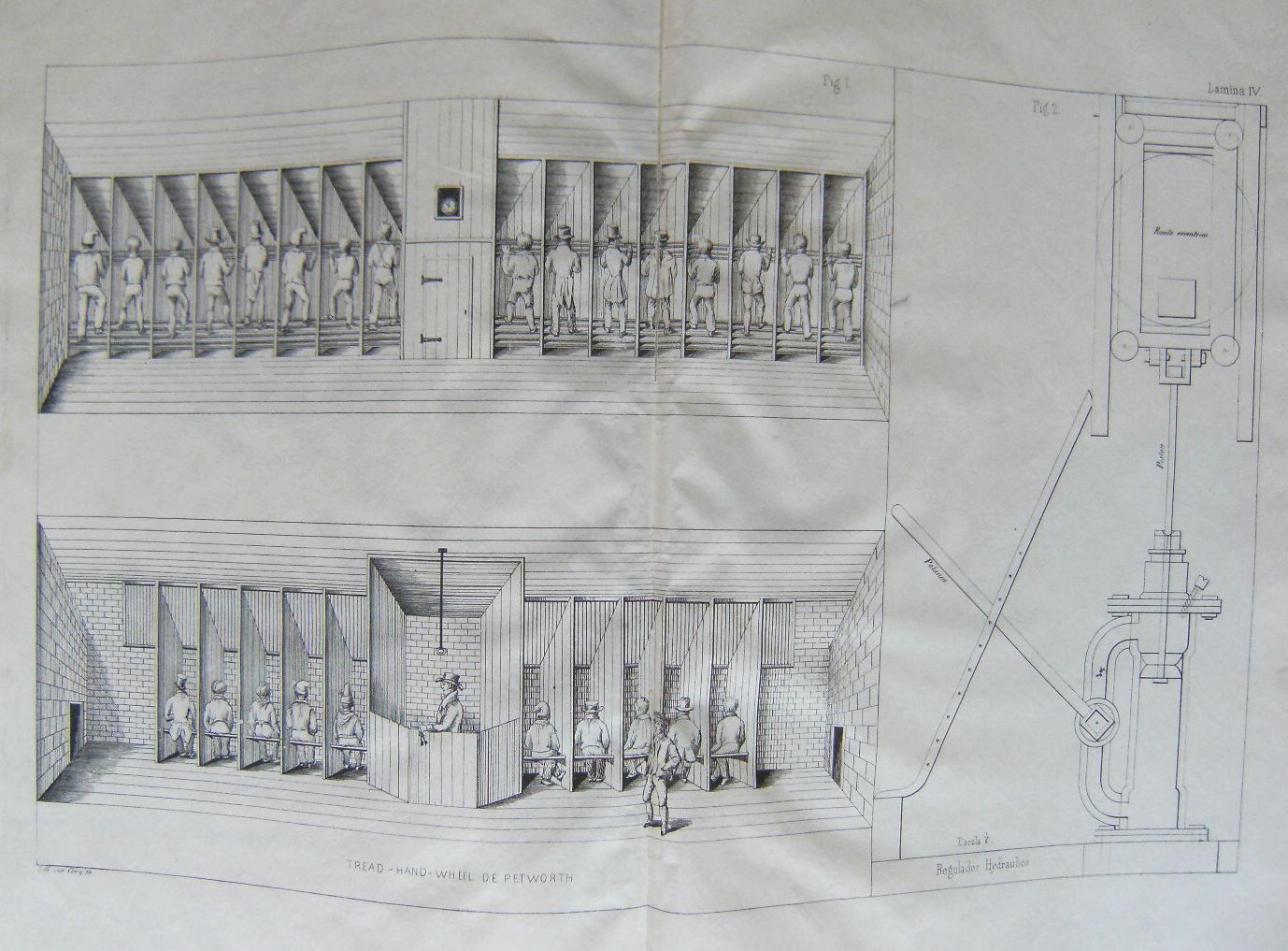
First (only) edition. A rare atlas with ground plans and front and side views of projected and
existing cellular prisons in France, England and some other countries including fine plates of tread-wheels and
similar machines for ‘labor of the hardest and most servile kind'.
A first series of 25 leaves contains sketches for some 13 different types of buildings for cellular
confinement, mostly a groundplan on one leaf and profile views on the next. Most of these are identified only as
‘provincial prisons' with 12 up to 126 cells, including some dome-shaped. Three others are identified as projects
for prisons for the cities of Caen, Madrid and Rome.
The second series of 14 leaves is concerned with penitentiary institutions mostly in England and Scotland:
groundplans of Westminster and Millbank prison, tread-mill in Gloucester, tread-hand-wheel in Petworth,
crank-mill with separators, solitary crank-mill (constructed by Richmond & Son Engineers, Chelmsford) with an
ergometer, plan for a prison with 284 cells by John Sibly, chapel-shaped cellular prison, Edinburgh and Glasgow
Bridewell, and prisons in Geneva, Lausanne and Ghent.
Most leaves are signed by A.Blouet or Harou-Romain, some are signed by others or are unsigned; all were
lithographed by G.Schatter.
Ramon de La Sagra was a Spanish anarchist, political thinker and botanist, now best remembered for his
important works on the history of Cuba. He lived in Paris for a time and made extensive travels through Europe
with the purpose to investigate the condition of charitable institutions and the prison system in these countries.
More plates from the second series and a third and fourth series announced on the rear cover never
appeared. A text volume (104p. in 8vo) issued the same year is not present here.
LEIBNIZ, Gottfried Wilhelm (1646-1716)
Essais de theodicée sur la bonté de Dieu, la liberté de l'homme, et l'origine du
mal. Par Mr. Leibnitz. Seconde edition.
A Amsterdam, chez Isaac Troyel 1712.
[LII],660p. Contemp. calf, neatly rebacked preserving most of the original. Some browning,
mostly limited to the last quires and the additional titles, tiny paper flow at foot of title. Bookplate of the
Bridgewater Library to front pastedown. As often bound with two other titles by Leibniz, see below. (#28850)
€ 4500
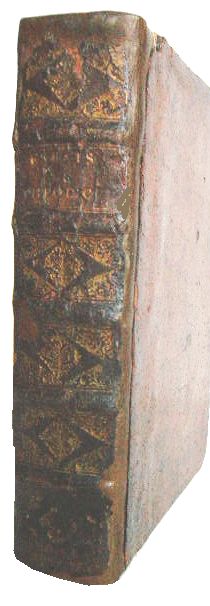 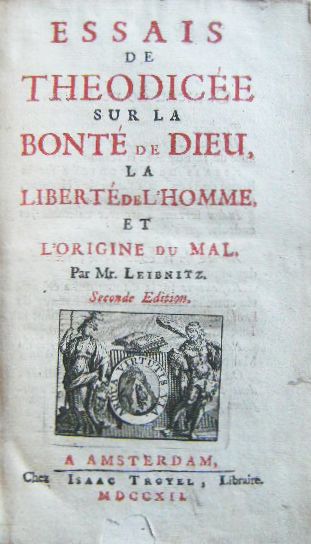 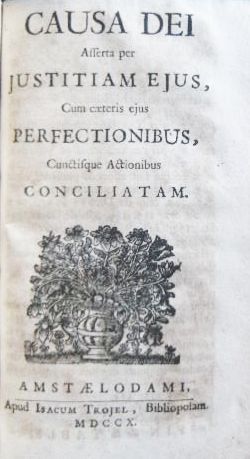 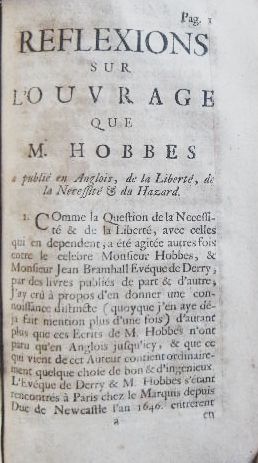 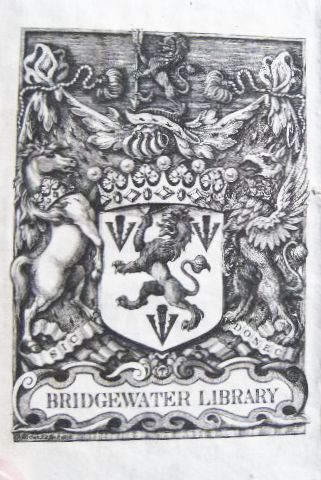
First edition, second issue. Though marked ‘seconde edition' this is actually a new issue of
the first edition of 1710. It has a new title-page, now - other than the first sissue - with Leibniz' name as the
author stated. This is Leibniz' best known philosophical work published in his lifetime, many times reprinted and
widely read. It was the outcome of philosophical discussions with Sophie Charlotte, queen of Prussia, on
questions, many of which had been raised by Pierre Bayle, of the conformity of faith with reason, free will, evil
and the justification of God's creation.
The Bridgewater Library was a family library, the oldest large family collection in England to survive
intact into modern times. Most of the library was sold to Henry Huntington in 1917 and now forms the core of
the Elizabethan and early Stuart collection at the Huntington Library.
*Ravier 70. Printing and the mind of man 177.
Bound with: Causa Dei asserta per justitiam ejus, com caeteris ejus perfectionibus, cunctisque
actionibus conciliatam. Amstelodami, apud Isacum Trojel 1710. 46p. With folding table. *Ravier 68.
And with: Reflexions sur l'ouvrage que M. Hobbes a publié en Anglais, de la
liberté, de la necessité & du hazard. [No place, no date]. 99p., including caption-title.
MAFFEI, Scipione (1675-1755)
Consiglio politico finora inedito presentato al governo Veneto nell'anno 1736.
Venezia, dalla Stamperia Palese 1797.
125,[2]p. Contemp. tinted boards. Library stamp on title and small shelfmark on 2 following
pages, some staining. (#38023)
€ 300  |
First (only) edition. Advices for the rulers of Venice, written as early as 1736 after a trip through England,
Holland and Germany. It could not be printed because of its sharp criticism of the present system of government,
but it had circulated in manuscript. Maffei's emphasis on the need of reform, the extension of the participation of
its citizens and the separation of powers has made him ranked among the forerunners of Montesquieu.
Maffei is best known as an antiquarian, chiefly concerned with Etruscology and as a playwriter, but he also
wrote on religious matters and a variety of other subjects, like fortepiano instruments. In economics he is best
known for his attempt to reconcile the church doctrine on usury with the needs of modern commerce
(Dell'impiego del danaro, 1744).
| 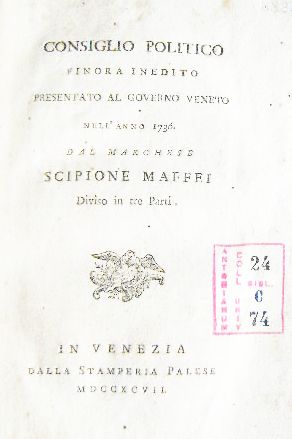 |
MAIMON, Salomon (1753-1800)
Versuch einer neuen Logik, oder Theorie des Denkens. Nebst angehängten Briefen des
Philaletes an Aenesidemus.
Berlin, bei Ernst Felisch 1794.
LVIII,438p. With folding table at end. Contemp. marbled boards, back with (chipped) green
label, red edges, some rubbing, repair to foot of back. Two stamps from monastery libraries on title and front
pastedown. (#38399)
€ 1250
First edition. Maimon was a Lithuanian Jew who denounced orthodox Judaism and spent most of his life in
Germany. Without an academic education and living in poverty, he developed into an independent thinker along
the lines of Leibniz, Wolff and Mendelssohn.
He became acquainted with the philosophy of Immanuel Kant, and became one of his most important
critics. Kant said about him that ‘not only do none of my opponents understand me and the main question so well,
but few have the ingenuity to conduct such a profound analysis as Mr. Maymon'. ‘Maimon's work is the product
of philosophical genius, and at its heart it is a serene account of reflection on thought that can instruct anyone to
unify the principles of logic, on the one hand, and the principles of our scientific approach to the world, on the
other, culminating in a thought-provoking metaphysics and philosophy of religion' (OUP).
An English translation by Timothy Franz appeared not before 2024 as Essay on a new logic or theory of
thinking.
|  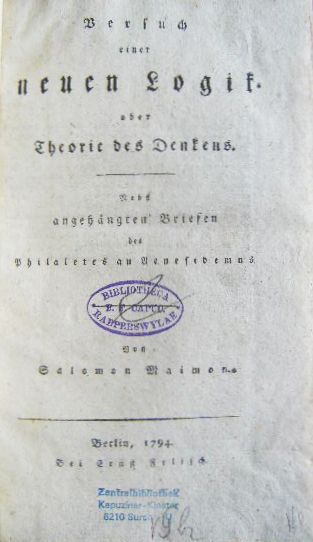 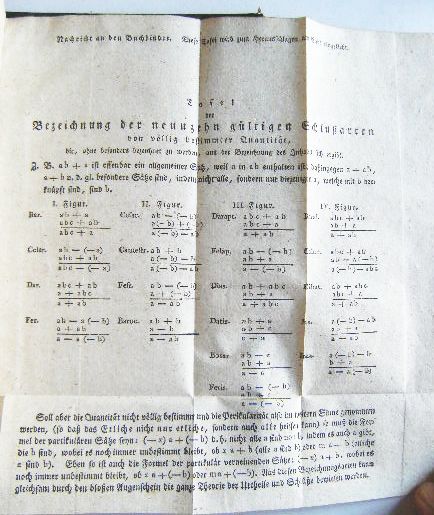 |
MALTHUS, Thomas Robert (1766-1834)
Definitions in political economy, preceded by an inquiry into the rules which ought to guide political
economists in the definition and use of their terms; with remarks on the deviation from these rules in their
writings.
London, John Murray 1827.
VIII,261p. Fine recent two-tone boards, back lettered black, marbled edges. Corner of half-title
clipped. A nice copy. (#29316)
€ 2000
First edition. Malthus' last book in which he occupied himself with the terminology of economic science. In
his preface he writes that ‘the differences of opinion among political economists have of late been a frequent
subject of complaint; and it must be allowed that one of the principal causes of them may be traced to the
different meanings in which the same terms have been used by different writers'. The first half of the book is
taken by increasingly polemical criticisms of the use of words by Adam Smith, Say, Ricardo, James Mill,
McCulloch and Samuel Bailey, the last two chapters contain definitions of 60 terms, followed by observations on
the defitiions.
‘In his Definitions in political economy [Malthus] enunciated four ‘Rules for the definition and
application of terms in political economy', and listed sixty definitions of economic concepts. However, Malthus's
understandable obsession with his own interpretation of the measure of value, with his own definition of wealth
in terms of material goods only, and with his belief that wealth should not be defined in terms of goods having
value in exchange, meant that he, rightly or wrongly, had become estranged from the usages current amongst
other economists, and that in some respects his attempts to introduce order and clarity merely exacerbated the
terminology confusion. Nevertheless, the Definitions remains significant as an early contribution to the
methodology of economics, and one which repays consideration in times of terminological confusion.'
Kress C.1924. Goldsmiths' 25180. Einaudi 3665. New Palgrave III,p.284.
|  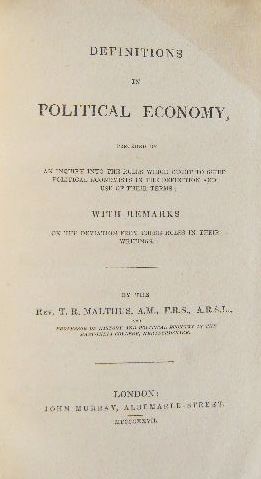 |
The Great Quarto, virtually a new
book MALTHUS, Thomas Robert
(1766-1834)
An essay on the principle of population; or, a view of its past and present effects on human happiness;
with an inquiry into our prospects respecting the future removal or mitigation of the evil which it occasions. A
new edition, very much enlarged.
London, printed for J.Johnson 1803.
4to. VIII,[4],610p. Contemp. calf, rebacked to style, boards rubbed but neatly reconsolidated.
Stamp on title, occasional foxing, mostly limited to the first and a few other quires, two pages with a marginal
tear. A good copy. (#20777)
€ 2500 | 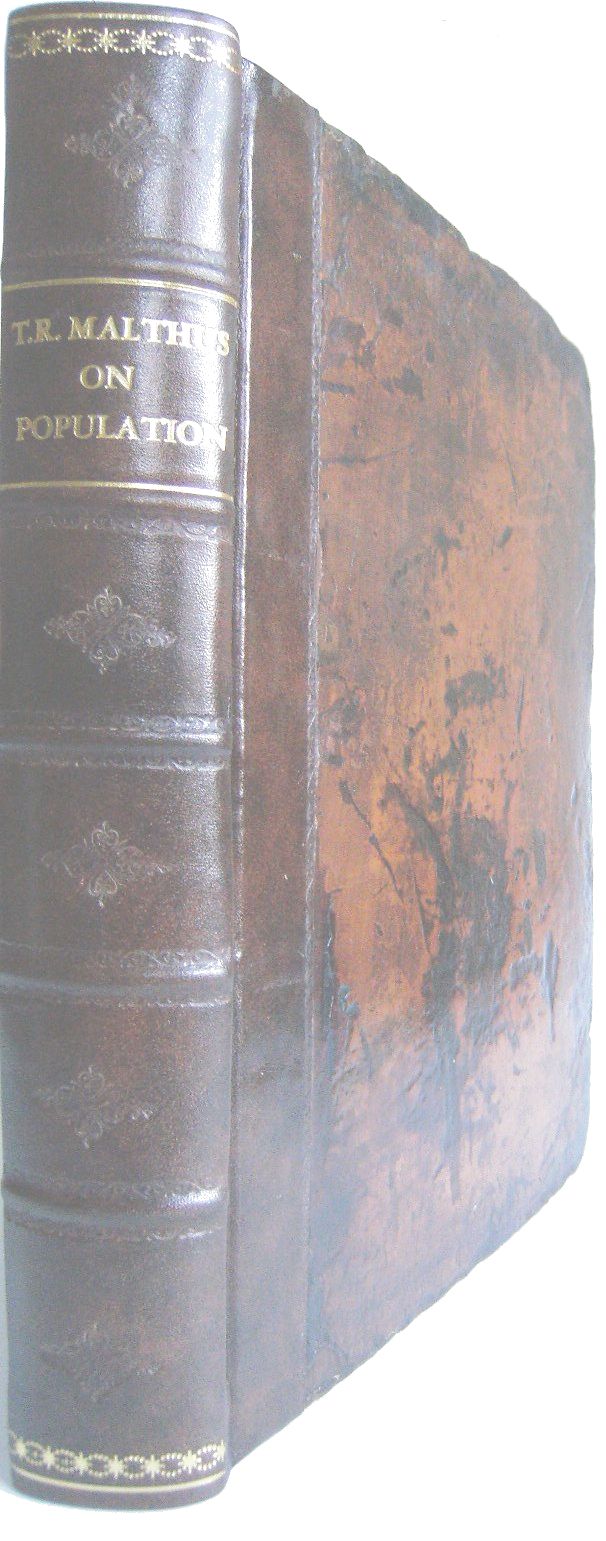 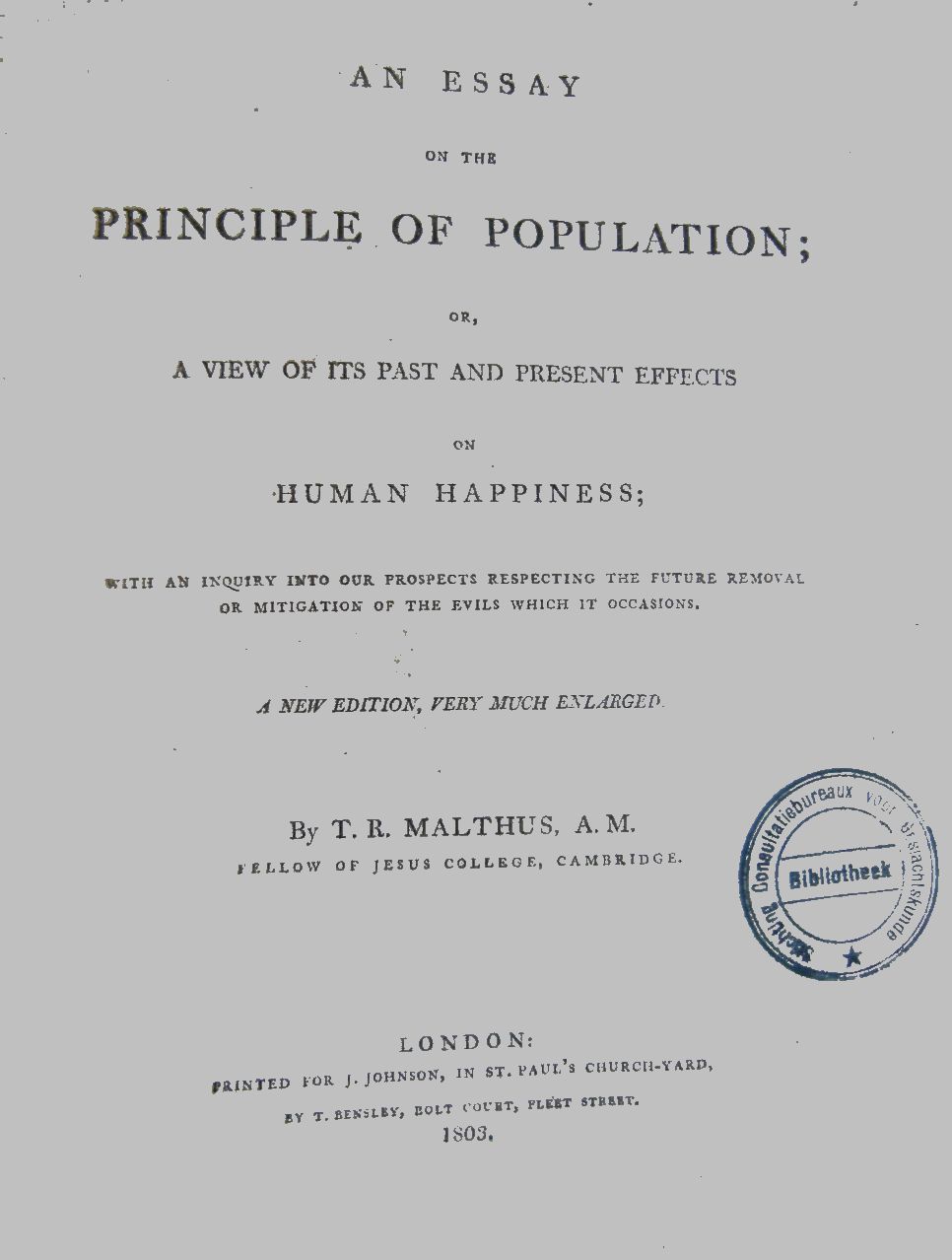 |
Second edition, the so-called ‘great quarto'. This edition was thoroughly and drastically revised and was
practically a new book. The first edition of 1798 was an octavo volume counting 400 page only; it was published
anonymously.
[MANDEVILLE, Bernard (1670-1733)]
Pensées libres sur la religion, l'eglise, et le bonheur de la nation. Traduites de l'Anglois du
docteur B.M. Nouvelle edition corrigée.
A La Haye, chez Vaillant 1723.
2 volumes in 1, continuously paginated. [XXVIII],498,[47]p. Contemp. calf, gilt back, red
edges, top of back little damaged, corners showing. (#25348)
€ 350  |
Second French edition. Originally published in 1720 as Free thoughts on religion, the church, and
national happiness and soon translated into French and other languages. A well known treatise against
religion, theology and particularly clerical politics, and a plea for civil and religious toleration and peace.
‘Mandeville followed Bayle in skeptically arguing for toleration and against priestcraft, in particular clerical
politics. He pointed out that most men believe about God what they have been taught from infancy, but few men
live according to their professed beliefs. Atheists, whether abstruse philosophers or aristocratic libertines, are few
and harmless' (IESS IX,p.555).
The translation has been attributed to Justus van Effen (1684-1735), a well known writer of spectatorial
fiction, for the greater part written in French. The first French edition was also published in the Netherlands in
1722.
| 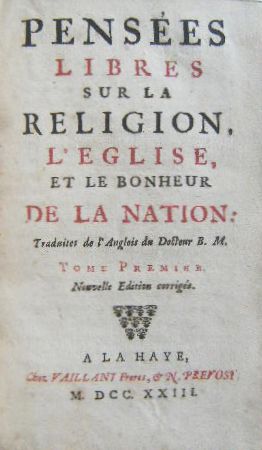 |
MAY, Johann Carl (1731-1784)
Versuch einer allgemeinen Einleitung in die Handlungs-Wissenschaft theoretisch und praktisch
abgehandelt.
Altona, verlegts David Iversen, Königl. privil. Buchhändler in Holstein 1763-1764.
2 volumes in 1. [XII,14],160,[4],161-332,[4],333-486, 208,[4],209-602p., thus complete.
Contemp. vellum, some soiling, edges painted. Outer margin of dedication leaf cut short. (#38703)
€ 750 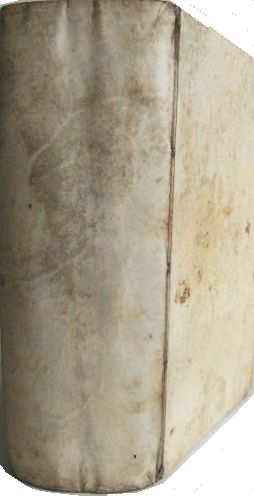 |
A comprehensive general introduction to commercial sciences, according to Humpert first published
anonymously the previous year, and several times reprinted up to 1817.
‘Vorläufige systematische Einleitung, oder Entwurf der allgemeinen Einleitung in die
Handlungswissenschaft. Von der Handlung, den Manufacturen, Fabriken und der Schiffahrt, nach ihren
allgemeinen Hülfstheilen überhaupt. Von den Eigenschaften eines Handelsmannes, von seinen
allgemeinen Verrichtungen; von den Handlungsgesellschaften und den Mäcklern. Von der Land- und
Stadt-Wirtschaft. Von der Schiffahrt. Von den Waaren- Wechsel- Commissions- und
Expeditions-Geschäften.'
*Humpert 5289.
| 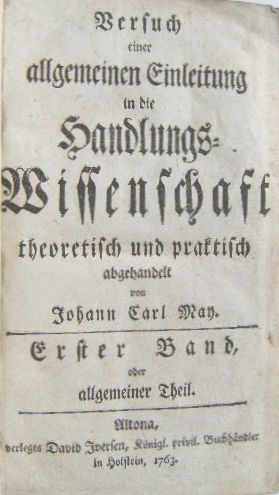 |
MCDONALD, James Grover
(1886-1964)
Letter of resignation of James G. Mcdonald, High Commissioner for Refugees (Jewish and Other)
Coming from Germany. Addressed to the Secretary General of the League of Nations. With an annex containing
an analysis of the measures in Germany against ‘Non-Aryans', and of their effects in creating refugees. [Dated
London, December 27th, 1935.]
[Chicago] January 15, 1936.
Folio (30,5 x 21,5 cm). [IV],101-127p. An offprint from The Christian Century, an
undenominational journal of religion, volume LIII, number 3, in the form of a Supplement to the Journal.
(#23955)
€ 750 | 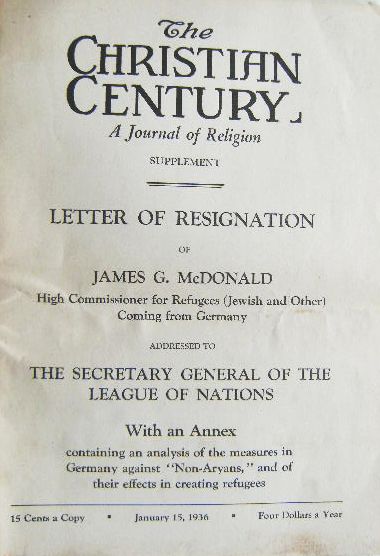 |
James GroverMcDonald was appointed High Commissioner for Refugees (Jewish and Other) Coming from
Germany by the League of Nations in October 1933. He encountered little support for his attempts to find
solutions for the numerous displaced Jewish refugees. He finally resigned because in the two years since his
appointment the conditions in Germany for ‘non-Aryans' which create refugees had deteriorated so
catastrophically ‘that a reconsideration by the League of Nations of the entire situation is essential'.
His letter of resignation occupies the first four pages and is followed by a comprehensive account of the
continued deteriorating conditions for the non-Aryan population in Germany. It is divided into four chapters:
Discriminatory legislation: the ‘Aryan' decrees, administrative measures and party activity, application of racial
law by the courts, and ‘unwelcome guests'.
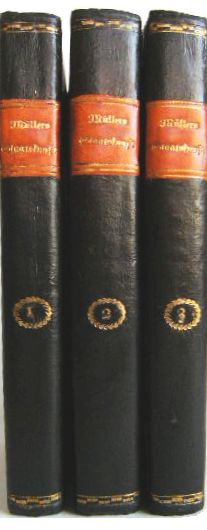 | MüLLER, Adam Heinrich (1779-1829)
Die Elemente der Staatskunst. Oeffentliche Vorlesungen, vor Sr. Durchlaucht dem Prinzen Bernhard
von Sachsen-Weimar und einer Versammlung von Staatsmännern und Diplomaten, im Winter von 1808
auf 1809, zu Dresden, gehalten.
Berlin, J.D.Sander 1809.
3 volumes. Small 8vo. XXVIII,298; [II],375; [II],328p., volume 2 p.367-368 and volume 3
p.324-325 omitted in the pagination but thus complete. With 3 folding tables. Contemp. marbled boards, black
backs gilt decorated with red labels. Small old circular stamp in corner of front free endpapers. A very nice set.
(#28783)
€ 2500 | 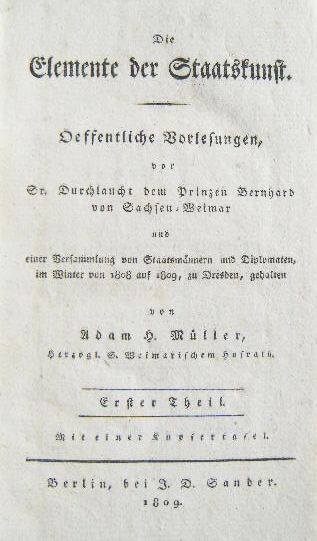 |
First edition of the main work of the author, a series of lectures held at Dresden. Adam Müller was a
diplomat in Austrian service, an ardent opponent of the ideals of the Enlightenment and one of the intellectual
voices of the post-Napoleonic restoration, and the most important political economist of the German Romantic
school. Müller defended a system of organic unity of society and the state and hence rejected the economic
individualism of Adam Smith.
*Kress B.5552. Humpert 1059. Not in Goldsmiths' or Einaudi. New Palgrave III,p.561. At length: J.Baxa,
Adam Müller, p.100-109.
First edition of the Code Savary in
quartoOrdonnances de Louis XIV, roy de France et de Navarre,
données à Saint Germain en Laye au mois de Mars 1673.
A Paris, Chez les Associez choisis par ordre de sa Majesté pour l'impression de ses nouvelles
ordonnances [at end: A Paris, de l'imprimerie de Denys Thierry] 1673.
4to. [VIII],120,[24]p. Contemp. calf, gilt back, sprinkled edges, light wear to spine ends, one
corner showing. (#33726)
€ 2500
First edition. The first French codification of commercial law, initiated by Colbert, and known as Code
Savary because of the great influence that Jacques Savary had on its creation. The Code Savary set standard rules
for commercial transactions throughout the kingdom, replacing existing customary legislation.
Jacques Savary (1622-1690) was a successful French merchant, widely recognised as an expert on
questions regarding commerce and also known as the author of his many times reprinted handbook for merchants
Le parfait négociant.
* Goldsmiths' 2037 (the 16mo edition only).
|  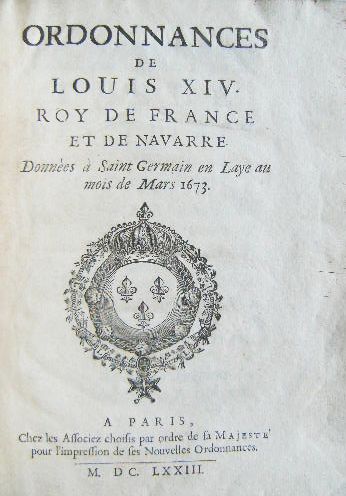 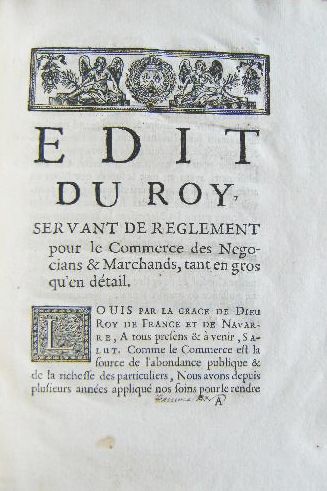 |
PINTO, Isaac de (1717-1787)
Der Jude für die Religion, oder Kern der Beweisgründe wider die Materialisten, nebst
neuen Anmerkungen über die natürliche Beschaffenheit unserer Kenntnisse, das Daseyn Gottes, und
das Unkörperliche Wesen und die Unsterblichkeit der Seele. Aus dem Französischen des Herrn J. von Pinto,
Mitglied der portugiesischen Synagoge, übersetzt.
Frankfurt und Leipzig, bey den Gebrüdern van Düren 1776.
Small 8vo. 19,[V contents and advert.],164p. Contemp. vellum, back with label, red edges.
Stamps on title. (#37074)
€ 1250  |
First (only German) edition. An apology of monotheistic religion and a fierce rejection of the atheism and
materialism of the philosophers of his time, inspired by Hemsterhuis' Lettre sur l'homme et ses rapports,
yet also a plea for tolerance. The original French edition Précis des arguments contre les
matérialistes was published in The Hague in 1774.
Isaac de Pinto was born into a wealthy Jewish family from Amsterdam and well educated, and became one
of the most respected men of affairs of his time. He was an advisor to stadholder William IV and director of the
East-India Company. He is now best remembered for his important contribution to economic theory
Traité de la circulation et du crédit published in Amsterdam in 1771. He also got fame as
a defendor of the rights of the Jews Apologie pour la nation juive (1762).
| 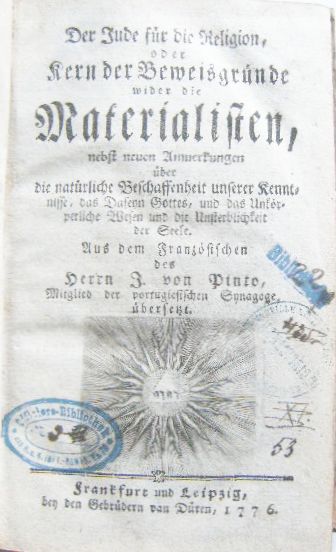 |
POPPER, Karl (1902-1994)
The logic of scientific discovery.
London, Hutchinson [1959].
480p. Orig. cloth, top edge red. With dust jacket, back a little sunned, upper and lower margin a
little (5 mm) frayed. (#40823)
€ 350 | 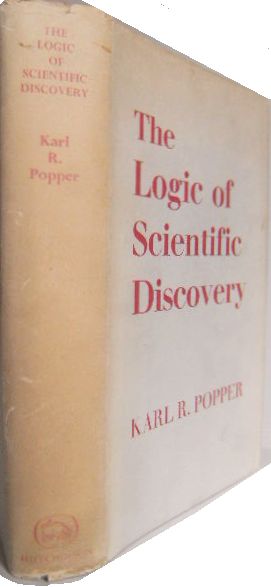 |
First English edition, a much revised translation of Logik der Forschung of 1935, with Popper's
preface dated 1958. Added: A detailed typewritten ‘list of publications‘ of Popper 1925-1959. The last listed
item is the present volume dating this London edition January 12th 1959. Hence this London edition seems to
precede the New York Basic Books edition of March the same year.
QUESNAY, François (1694-1774)
Essai physique sur l'oeconomie animale. Seconde édition augmentée de deux volumes,
& de tables fort amples.
A Paris, chez Guillaume Cavelier 1747.
3 volumes. 12mo. CXII,[12],612; [IV],662,23; [IV],768p. With engraved frontispiece to
volume 1. Contemp. calf, gilt backs, marbled endpapers, red edges, some neat repairs. Small number stamp to
corner of title and small red stamp to verso and to lower margin of last page of each volume. (#20039)
€ 1250
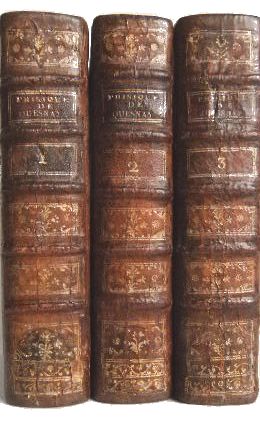 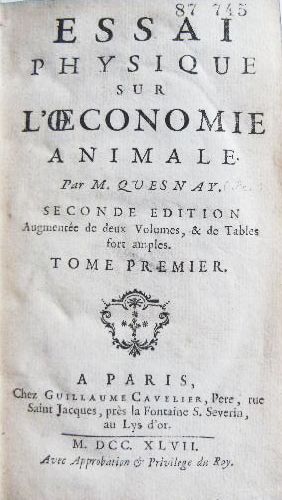 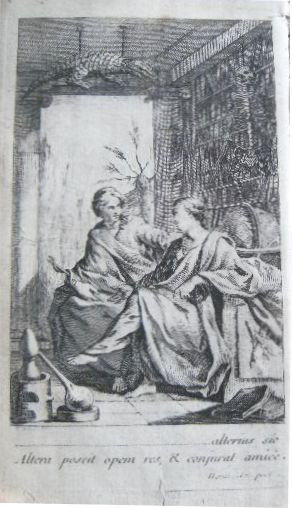
The largely augmented second edition of Quesnay's chief work on fysiology. The first
edition of 1736 was made up on one volume of 296 pages only. It is in this edition that Quesnay's economic ideas
appear for the first time, notably on the pages 364-372 of the third volume.
It is generally agreed that Quesnay's fysiological studies formed the basis for his later economic studies.
Extracts from the third volume of this second edition were included by Oncken in his edition of the economic
works of Quesnay (1888). ‘The third volume concerns particularly with philosophical matters. It conceals the
basis of the ulterior development of his practical philosophy, or, which is the same for Quesnay, of his economic
philosophy‘ (Oncken p.740).
*Kress and Goldsmiths' have the first edition only. Not in Einaudi.
RAGOUNEAU, A.M. (ca. 1760-1811)
Recherches sur l'état actuel des sociétés politiques, ou jusques à quel
point l'économie intérieure des états modernes leur permet-elle de se rapprocher de la
liberté et de l'égalité?
A Paris, chez Levrault, frères An XI (1803).
XII,313,[5]p. Contemp. calf, back richly gilt, decorated endpapers, yellow edges, small repair to
top of back. Some quires browned, small damp stain in upper right corner. Author's inscription partly cut away by
the binder. (#38138)
€ 500  |
First and only edition. A treatise investigating the relations between political economy and the political aim
of a free and righteous society. The author treats the right of property, inequality, luxury and industry, foreign
trade and money, etc.
The auhor, an official of the city of Strasbourg, seems well acquainted with the economic literature of his
time; he mentions Quesnay and Steuart, and shows particularly admiration for Adam Smith (‘un génie
supérieur').
*Kress B.4724. Goldsmiths' 18615. INED 3708.
|  |
RICARDO, David (1772-1823)
Grundgesetze der Volkswirthschaft und Besteuerung. Aus dem Englischen übersetzt von Dr.
Edw. Baumstark. [Volume 2:] Volkswirthschaftliche Erläuterungen vorzüglich über David
Ricardo's System.
Leipzig, Wilh. Engelmann, 1837-1838.
2 volumes. X,V-XXXII,461,[1 blank, 1 errata, 1 blank, 2 advert.]; X,[2],830,[2 errata]p., thus
complete. With 6 folding tables. Fine modern half calf, gilt back with black labels, old signature on the original
front free endpapers. An appealing set. (#23554)
€ 1250 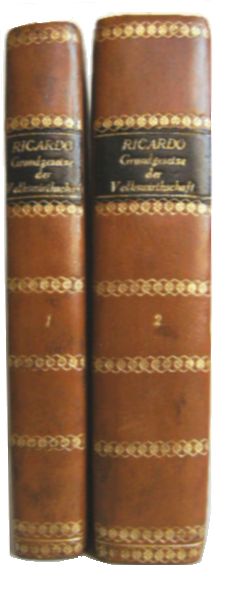 |
Second German edition of Ricardo's masterpiece, first published in German in 1821 in a translation by
Christ. Aug. Schmidt. This new ‘excellent' (J.K.Ingram) translation with Baumstark's valuable notes became the
standard for later editions. Baumstark's preface (p.V-X of the first volume) was apparently later added to only
part of the edition, which explains the irregular pagination. It is lacking in most copies.
Edward Baumstark was professor of cameral sciences at the University of Greifswald and a politician with
moderate liberal principles.
*Kress C.4476. Humpert 13102. Carpenter, Economic bestsellers before 1850, XXXVII,11.
| 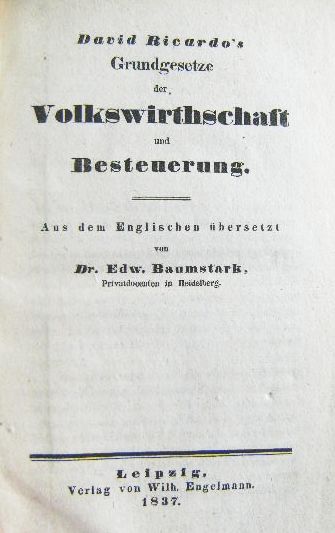 |
RIZZETTI, Johannis [Giovanni] (1675-1751)
Ludorum scientia publico beneficio illustrata.
Venetiis [Venice], apud Aloysium Pavinum 1725.
Small 4to. [VI],40 p. With 2 headpieces and 2 ornamented initials. Contemp. carta rustica. Title
with 3 stamps. (#34644)
€ 450
First (only) edition. A critical commentary on the works on the theory of probability of Daniel Bernoulli
and Montmort. Rizzetti came from a noble family and studied law, philosophy and mathematics and belonged to
the group of Italian scholars around Count Jacopo Riccati known as ‘Schola Riccatiana'. In 1727 he published a
work challenging Newton's theory of colour and light.
A revised version of the present work appeared in 1729 in the Acta Eruditorum. It was translated
into English in 1729 as The knowledge of play, written for public benefit, and the entertainment of all fair
players, with some additions by the translator Richard Seymour, and by Jonathan Swift and Alexander Pope.
Todhunter is very critical about it.
*Riccardi I,p.382. Todhunter p.614.
| 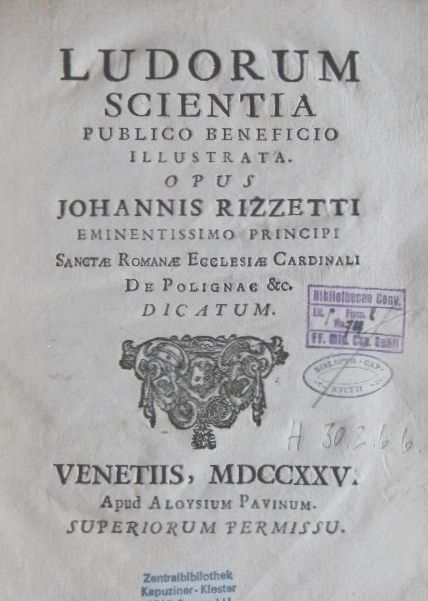 |
SCHOELCHER, Victor (1804-1893)
Des colonies françaises. Abolition immédiate de l'esclavage.
Paris, Pagnerre 1842.
III-LII,443p., wanting half-title. Contemp. half morocco, gilt back, marbled sides and
endpapers, sprinkled edges. Mild foxing to first and last leaves. Fine copy. (#40272)
€ 2500  |
First edition. One of the earliest and most important books of this famous abolitionist. Schoelcher had first
traveled to the Americas in 1828 and again in 1840 visited the Caribbean and especially Haiti. He amply studied
slavery in the French and British colonies and discovered the harsh reality of slavery. Initially in favor of the
gradual abolition of slavery, he started advocating for its immediate abolition. The present text provides decisive
arguments for that. ‘It alone would save the colonies from a new insurrection and would be able to allow the
integration of the new free people into French citizenship.'
*Sabin 77745.
| 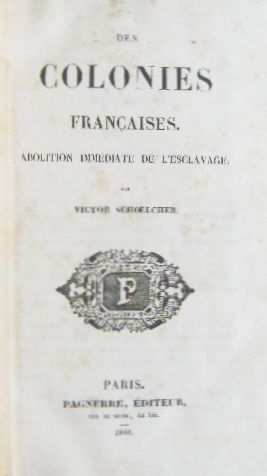 |
Huygens on chanceSCHOOTEN, Franciscus van (1615-1660)
Mathematische oeffeningen, begrepen in vijf boecken. I. Verhandeling van vijftig arithmetische en
vijftig geometrische voorstellen. II. Ontbinding der simpele meet-konstige werck-stucken. III. Apollonii Pergaei
herstelde vlacke plaetsen. IV. Tuych-werckelijcke beschrijving der kegel-sneden op een vlack. V. Dertich
af-deelingen van gemengde stoffe. Waer by gevougt is een Tractaet, handelende van reeckening in speelen van
geluck, door d'heer Christianus Hugenius. Desen druck vermeerdert met een korte verhandeling van de
fondamenten der perspective.
[Amsterdam, Gerrit van Goedesbergh 1660; at end: Tot Leyden, gedruckt by Severin Matthysz 1660.]
4to. 544p., wanting A2 (title of the first part), quires Z and Vv bound in wrong order. Contemp.
vellum, some staining and a few brown spots. Slightly waving from a mostly vague dampstain in upper right
corner, with a brown spot affecting the upper margin and one or two lines of last 100 pages. (#32596)
€ 1500
Dutch edition of the author's principal mathematical work, originally published in 1657 in Latin as
Exercitationum mathematicarum libri quinque. It includes five treatises on various mathematical subjects.
Van Schooten was professor of mathematics at Leiden, and counted Christiaan Huygens and Johannes Hudde
among his students. He was well acquainted with a.o. Descartes and Mersenne and publisher of Viète's
Opera mathematica.
As an appendix (p.489-500) it has the first appearance in Dutch of Christiaan Huygens' treatise on the
theory of probability or game of chance, first published in the Latin edition of this volume as De ratiociniis in
ludo aleae. It is the earliest and one of the most important papers on the subject of probability. Bernoulli
reprinted it, with a commentary, in his famous Ars conjectandi. According to Todhunter it was originally
written in Dutch and translated into Latin by Van Schooten. ‘The treatise by Huygens continued to form the best
account of the subject until it was superseded by the more elaborate works of James Bernoulli, Montmort, and De
Moivre.'
*STCN 093407548. Bierens de Haan 4223. I.Todhunter, A history of the mathematical theory of
probability, p.22-25.
|  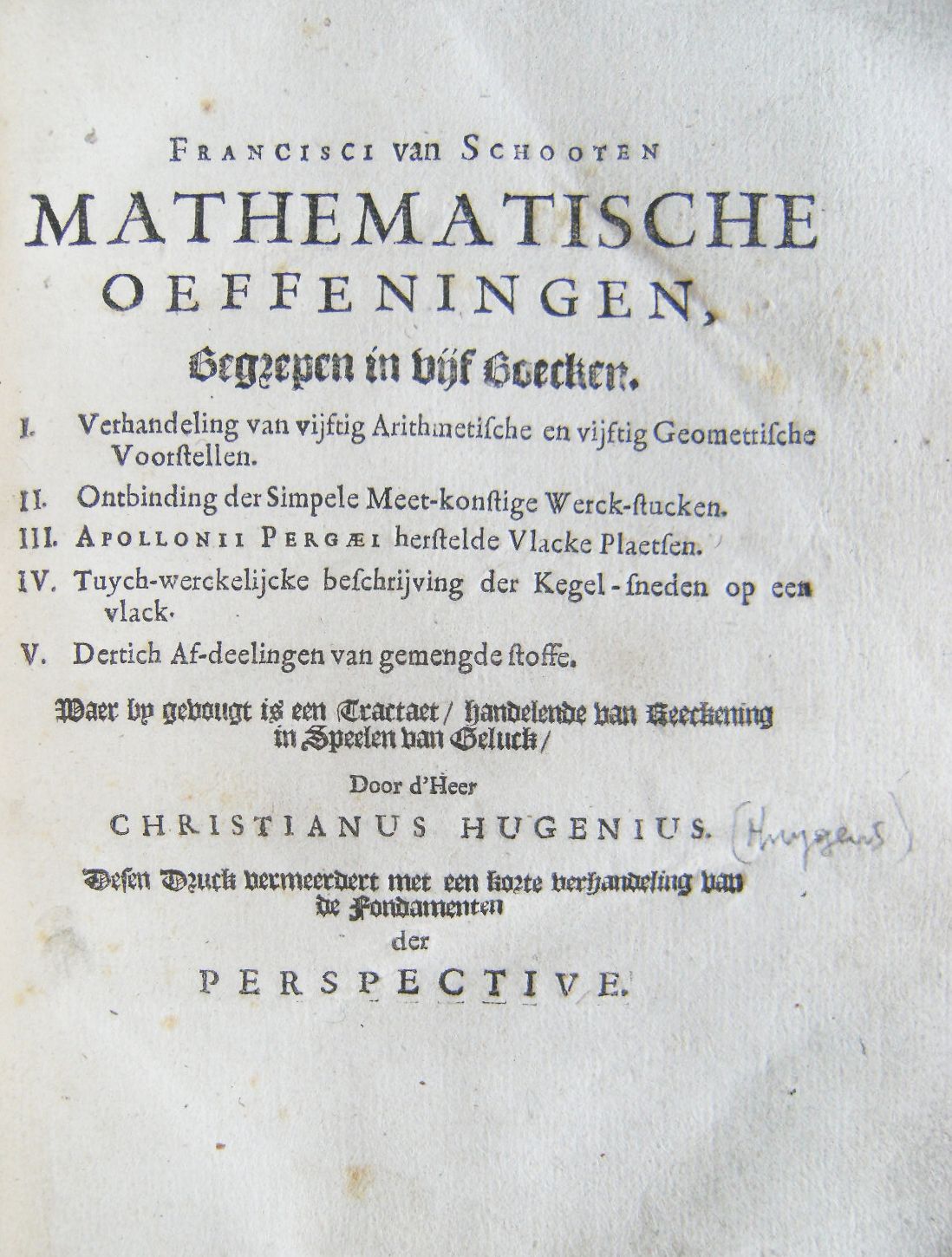 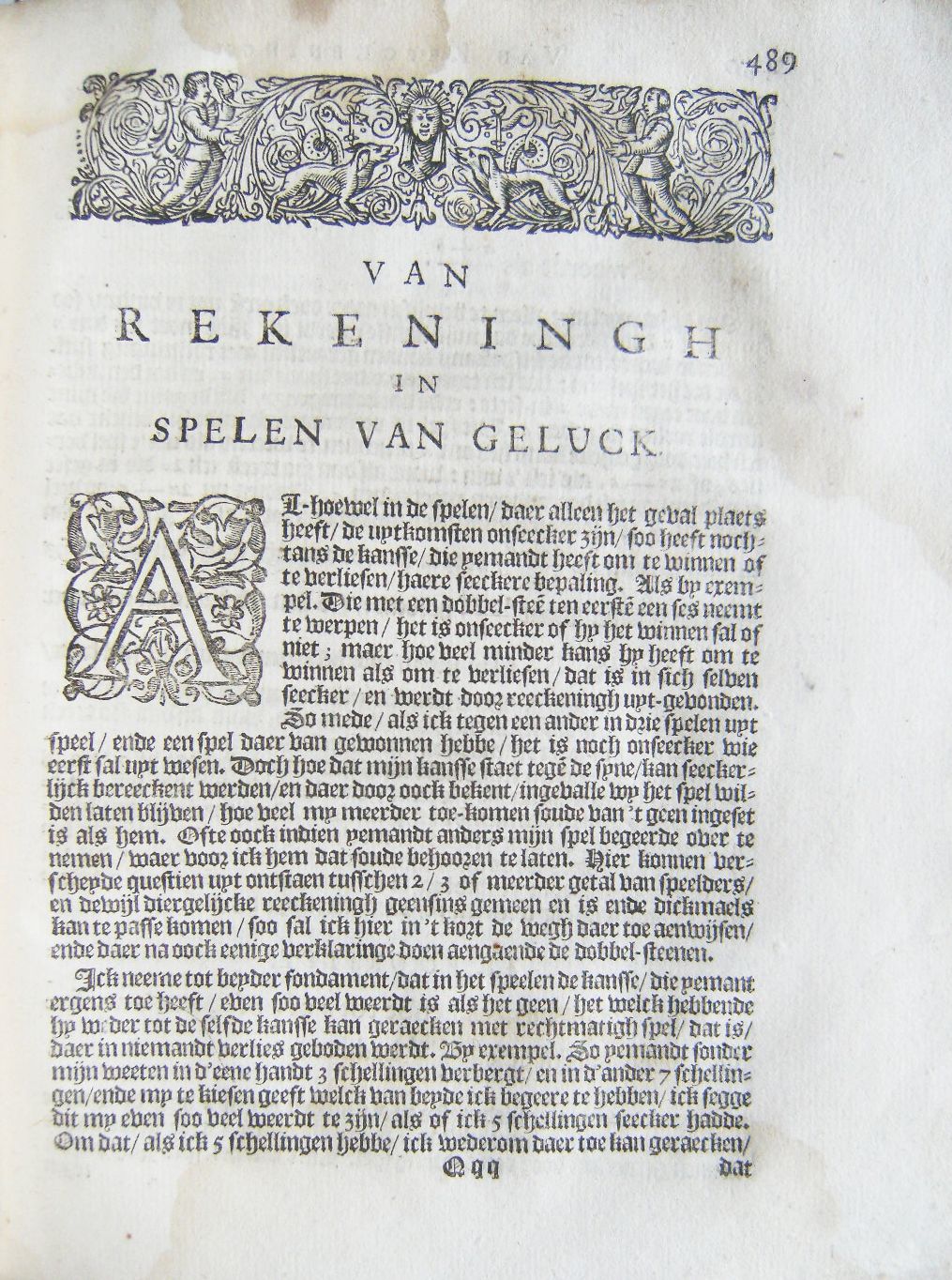 |
SOEKARNO [SUKARNO]
(1901-1970)
Indonesië klaagt aan! Pleitrede voor den Landraad te Bandoeng op 2 December 1930
gehouden. Voor het ‘Fonds Nasional' der Federatie van Indonesische Politieke Vereenigingen (P.P.P.K.I.)
Amsterdam, de Arbeiderspers 1931.
112p. Orig. photo-illustrated stiff wrappers with red lettering, vaguely damp stained towards
the end, lower wrapper loosening. (#19171)
€ 175 | 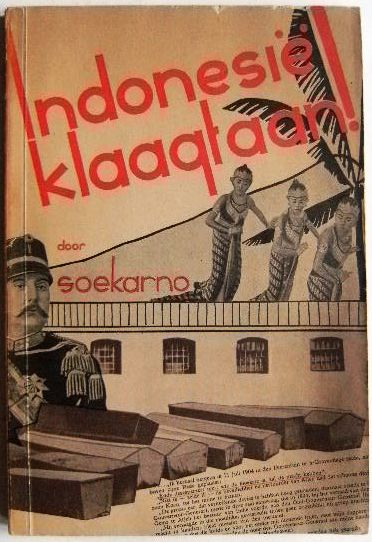 |
First (only) edition. The speech read in his defense before the Landraad (court for native Indonesians) in
Bandung. Sukarno, the future president of Indonesia (1945-1967) was accused of trying to overthrow the colonial
government of the Dutch East Indies. He was arrested in December 1929 and in December 1930 he was
sentenced to four years imprisonment, but released after one year. Indonesia accuses was ‘a landmark
political document against colonialism and imperialism'.
[THORBECKE, Johan Rudolph
(1798-1872) et al.]
Handelingen omtrent het voorstel van negen leden der Tweede Kamer van de Staten-Generaal, tot
herziening der grondwet, in 1845, en omtrent het voorstel van J.T.H. Jhr. Nedermeijer ridder Van Rosenthal.
's Gravenhage, Belinfante 1846.
XVI,721p. Omslag presentabel vernieuwd. (#35886)
€ 175 | 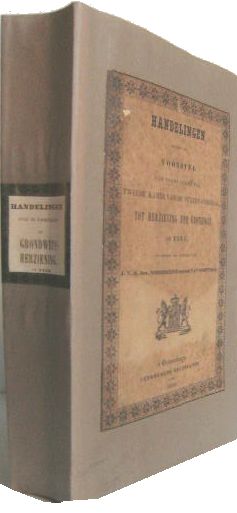 |
Eerste (enige) druk. Het voorstel tot herziening der grondwet, bekend als het Voorstel der Negenmannen.
Het voorstel van negen leden van de Tweede Kamer o.l.v. van Thorbecke werd behandeld in de zittingen van de
Tweede Kamer van 26 t/m 30 mei 1845. Het wordt hier gevolgd door een verbatim verslag daarvan.
Belangrijkste punt van het voorstel was de invoering van de ministeriële verantwoordelijkheid. Hoewel
verworpen in 1845 vormde het toch de basis voor de herziene grondwet van 1848. Zeldzaam.
TIEDEMANN, Friedrich (1781-1861)
Das Hirn des Negers mit dem des Europäers und Orang-Outangs verglichen.
Heidelberg, Karl Winter 1837.
Folio (32 x 24 cm). [2 advert.],VI,[2],84p. With 6 lithograph plates (somewhat smaller in size).
Contemp. grey boards, light wear to back and edges. Usual mild browning, old bookplate and inscription to front
paste-down. With loosely inserted erratum-leaf. (#31623)
€ 500 | 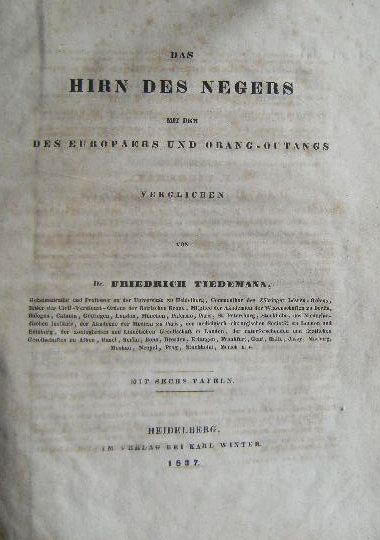 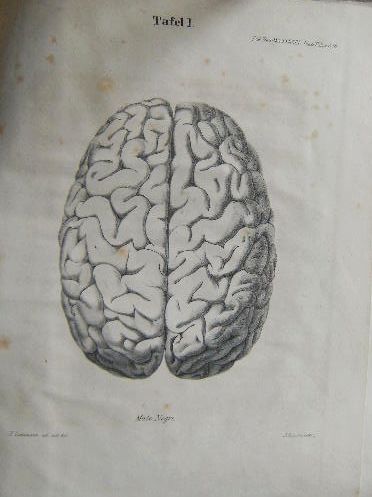 |
First edition thus. Originally published in English in the Philosophical Transactions of the Royal
Society in London in 1836 under the title On the brain of the negro, compared with that of the European and
the Orang-Outang.
Friedrich Tiedemann was professor in Landshut and Heidelberg and one of the greatest anatomists and
zoologists of his time. In his preface to this volume he writes that his research was provoked by the discussions in
the English parliament about the slave-trade and the emancipation of the blacks. The object of his investigations
was, in his own words, to assay ‘the almost generally accepted theory that negroes are a human race ... much
lower than other races, closely related to monkeys'. Tiedemann investigated the brains and crania of black
Africans, other human races and orang-outangs in anatomical collections in Europe. The results of his
investigations surprised his contemporaries: even though the crania of black Africans were indeed smaller than
those of Europeans, their brains were as large and as heavy. Tiedemann concluded that blacks indeed were as
capable as Europeans. Once he had concluded no essential differences in the structure of the brain, he
investigates whether there are differences in the ‘capabilities' of the soul (Seelen-Fähigkeiten). He
concluded that, despite the unfavourable conditions under which many blacks had to live, their intellectual
capabilities were equally developped.
In the last chapter Tiedemann goes beyond the limits of physical anthropology - his book was one of the
earliest works in that field - and investigates the reasons for prevailing unfavourable opinions about the
intellectual faculties of blacks. He concluded that this was fully due to the slave trade and to the inhuman and
cruel treatment of the slaves in America. He then proves that blacks indeed were able to great intellectual
performances: he gives examples of moral and intellectual achievements of African blacks in the use of natural
resources, their institutions, languages, arts and crafts, etc. and he proves that the disregard for the social and
religious life of Africans is fully unjustified. He ends with examples of people of black descent who have
distinguished themselves in the arts and sciences: Eliza Capitein, Benjamin Banneker, Olaudah Equiano, Ignatius
Sancho, Juan Latino, and many others.
TITSINGH, Gulielmus (1733-1803)
Bedenkingen over de schaarsheid van zeevarend volk in het gemeen, en het verval onzer nationale
zeevaart in 't byzonder.
Amsterdam, H.W. en C.Dronsberg 1780.
X,50p. Uncut in recovered blank wrappers. A few upper margins expertly reinforced, two old
stamps on title. (#33542)
€ 300 | 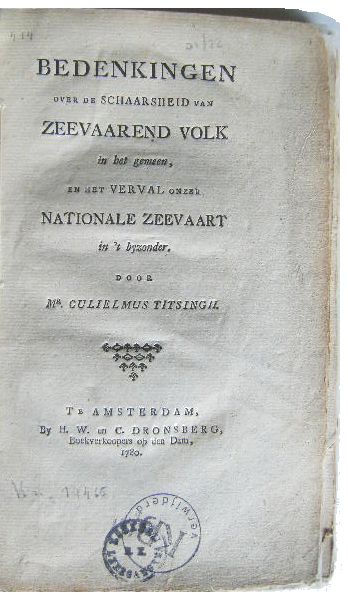 |
First (only) edition. A strong plea for the founding of a training college for sailors, provoked by the
shortage of qualified sailors and the decay of Dutch maritime trade. It was successful indeed because in 1785 the
Kweekschool voor de Zeevaart was founded. The author was an employee of the East India Company and
during the Batavian Revolution a member of the Comité tot de Oost-Indische Handel en
Bezittingen.
*Knuttel 19465. Landwehr 1594. Laspeyres p.154.
A precursor of LeninTKACHEV, Petr Nikitich (1844-1886)
Anarkhiya mysli. Sobrani kriticheskikh ocherkov. [ At head:] L'Anarchie de la pensée.
Par Pierre Tratcheff.
London, Tipografiya zhurnala ‘Nabat' 1879.
12mo (15x11 cm). 78p. Fine recent black boards, back with gilt-lettered red label, trifle rubbed,
orig. printed wrappers preserved (Lobstein). (#17178)
€ 1250
 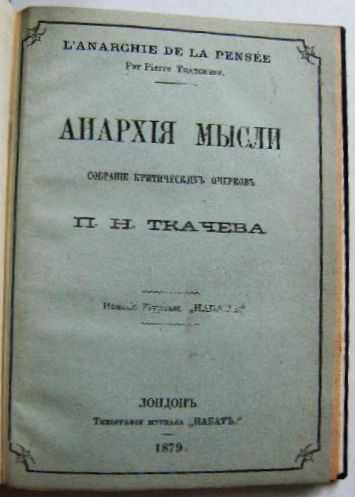  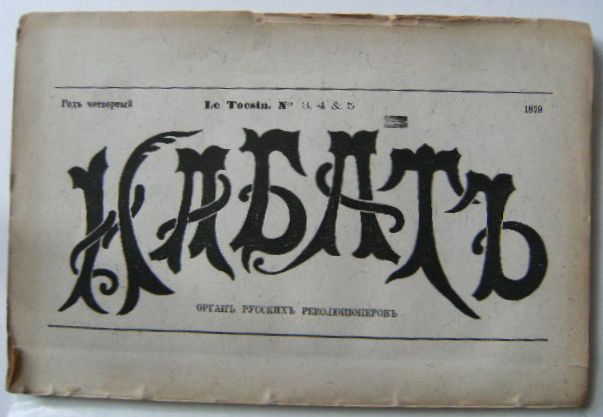
First edition thus. The Anarchy of thought is a collection of critical sketches, a
polemic against Bakunin et al. It is reprinted from the author's journal Nabat from Deceber 1875 to
February 1876.
Tkachev believed that a socialist society could only be realized by a revolutionary vanguard, a closely
organised revolutionary party. He was inspired by Jacobinism and Blanquism and much of his ideas were later
developed and put into action by Vladimir Lenin, ‘the symptomatic importance of which was not seen until the
following century' (Dekker & Nordemann).
*Zaleski 484. Nettlau p.219. Dekker & Nordemann Catalogue 26 (1980): The two Russian revolutions.
The libraries of Leon Bernstein and Boris Souvarine, 296.
Added: Nabat. Organ russkikh revoliutsionerov. [At head:] Le Tocsin. Zheneva,
Tipografiya zhurnala ‘Nabat' 1878. L,17-172,[1]p., thus complete. Orig. printed wrappers, small repair and small
chip.
The journal Le Tocsin appeared from 1875 until 1881, but no issues appeared in 1880. It was first
edited by Tkachev, since 1878 by K.Turskii and P.Gretsko. The absence of pages 1-16 is explained by Zaleski by
the suppression of the article about the change in editorship. Zaleski's remark that this journal is ‘of anarchist
tendency' doesn't seem right.
And: Nabat. Organ russkikh revoliutsionerov. [At head:] Le Tocsin. Nos 3, 4 & 5.
London, Tipografiya zhurnala ‘Nabat' 1879. [IV],90p. Orig. printed wrappers, slightly frayed.
*Zaleski p.42.
TOALDO, Giuseppe (1719-1797)
Tavole di vitalità.
In Padova, 1787. Nella stamperia di Gio. Antonio Conzatti ... e si trova presso Giacomo Storti in Nella
stamperia di Gio. Antonio Conzatti e si trova presso Giacomo Storti in Venezia.
4to (27,5 x 20 cm). 32p., the last 8 pages taken by tables. Contemp. carta rustica. (#35167)
€ 2500
First (only) edition. The first Italian work on population statistics. Toaldo meticulously and patiently
collected data from local parishes, which enabled him to publish the present work. His tables give the population,
number of deaths and survivors in any given year, with a calculation of survival probability. He pays great
attention to various aspects of differential mortality, with separate figures for the mountain, rural and urban
population, and for monastic and Jewish population. Thus he noted that the life expectancy of the monastic
population was higher than that of the secular population. He also noted that women were more vital than men.
‘A certain proof of this is that since more males are born than females, at every age there are more females than
males alive.'
Toaldo was a catholic priest and natural scientist, mostly interested in meteorology and astronomy. He was
professor of astronomy at Padua from 1764 and was the editor of the works of Galilei.
*Riccardi II,c.528. Not in Kress, Goldsmiths' or Einaudi. At length: Lucia Pozzi, Alle origini della
demografia italiana: le Tavole di Vitalità di Giuseppe Toaldo (1787).
| 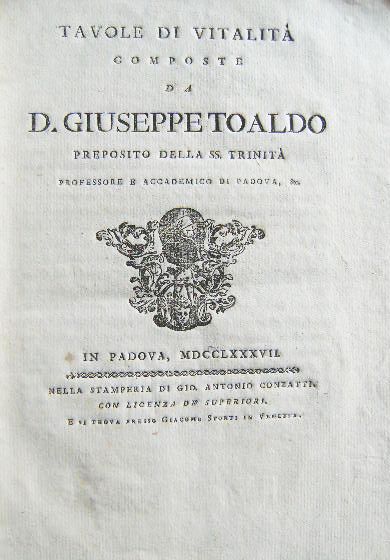 |
VENN, John (1834-1923)
The logic of chance. An essay on the foundations and province of the theory of probability, with
especial reference to its application to moral and social science.
London and Cambridge, Macmillan 1866.
Small 8vo. XXVII,[1],370p. Contemp. calf, back richly gilt with black label, gilt double line
borders, gilt inside borders, marbled endpapers, all edges gilt, edges of boards little rubbed, front hinge expertly
repaired. With armorial bookplate of Richard Shute, and short notice ‘Eton/ December 13/ 1866'. (#38190)
€ 900 | 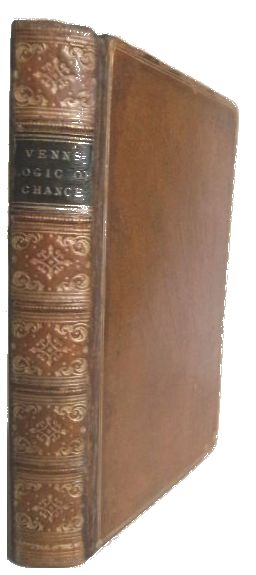 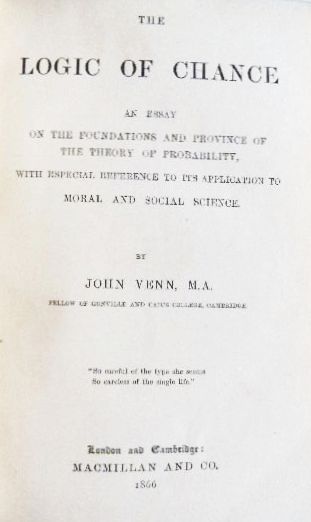 |
First edition. Venn's first and most important book which had a considerable influence on the theory of
statistics in the next decades, with new editions in 1876 and 1888. ‘A groundbreaking book which espoused the
frequency theory of probability, arguing that probability should be determined by how often something is forecast
to occur as opposed to "educated" assumptions.' Venn was also the owner of a collection of books on logic, at
that time the finest of its kind, donated to Cambridge University in 1888.
The bookplate may be from the British classicist and logician Robert Shute (1849-1886), who was
educated at Eton, or from his father who bore the same name.
Zee-rechten.
't Boeck der zee-rechten. Inhoudende dat hoochste ende oudste Gotlantsche water-recht, dat de
gemeene cooplieden ende schippers geordineert ende gemaeckt hebben tot Wisbuy ... [ Second title:]
Zee-rechten, dat is: Dat hoochste ende outste Gotlandtsche water-recht ...
Middelburgh, Symon Moulert 1637.
4to. [VIII],158p. With a vessel on the first and coat of arms of Zeeland on the second title-page.
Contemp. vellum, a little dust-soiled but a nice copy. (#40047)
€ 600  |
An early edition of a major source for early commercial law, republished many times until 1753. A rare
Middelburg printing, the first edition published outside Amsterdam.
The first part begins with the so-called Wisbyan compilation, a maritime code pretended to have
been agreed at Wisbuy (Gotland), printed in Holland for the first time in 1588. It is is followed by a great number
of proclamations, ordinances, etc. on maritime affairs issued since 1551.
Bound with: Quintyn WEYTSEN, Een tractaet van avarien ... Middelburgh, Symon
Moulert 1641. 16p.
And with: Ordonnantie ghemaeckt by bailliu, burghemeesters, schepenen ende raedt der
stadt Middelburgh, in Zeelandt op 't stuck van asseurantien. Middelburgh, Symon Moulert 1641. [16]p.
| 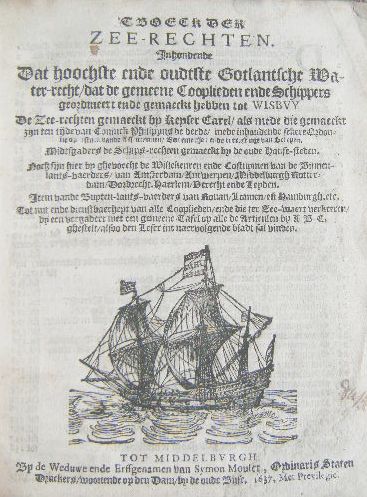 |
|
|



